Statements and messages of the Prime Minister of RA
Prime Minister Nikol Pashinyan's speech at the Commission investigating the circumstances of the 44-day war
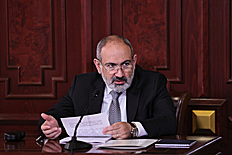 1670x1113px - 385 Kb
1670x1113px - 385 Kb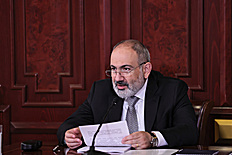 1670x1113px - 400 Kb
1670x1113px - 400 Kb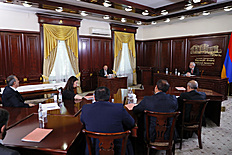 1670x1113px - 573 Kb
1670x1113px - 573 Kb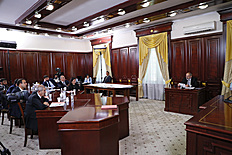 1670x1113px - 668 Kb
1670x1113px - 668 Kb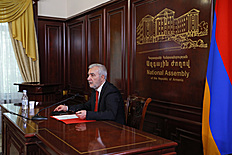 1670x1113px - 400 Kb
1670x1113px - 400 Kb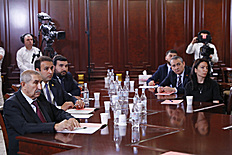 1670x1113px - 466 Kb
1670x1113px - 466 Kb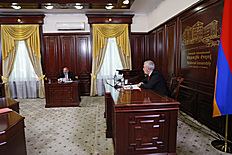 1670x1113px - 523 Kb
1670x1113px - 523 Kb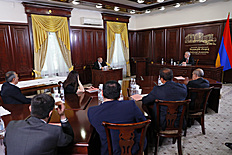 1670x1113px - 591 Kb
1670x1113px - 591 Kb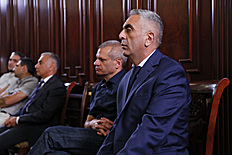 1670x1113px - 391 Kb
1670x1113px - 391 Kb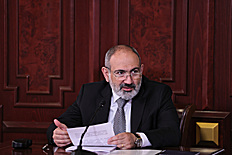 1670x1113px - 362 Kb
1670x1113px - 362 Kb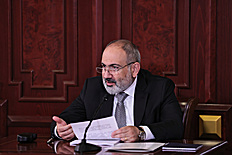 1670x1113px - 369 Kb
1670x1113px - 369 Kb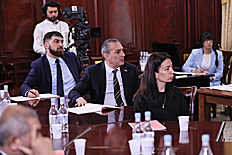 1670x1113px - 380 Kb
1670x1113px - 380 Kb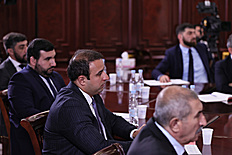 1670x1113px - 342 Kb
1670x1113px - 342 Kb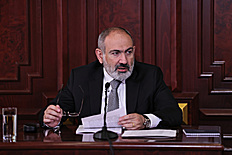 1670x1113px - 370 Kb
1670x1113px - 370 Kb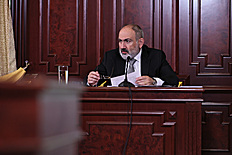 1670x1113px - 452 Kb
1670x1113px - 452 Kb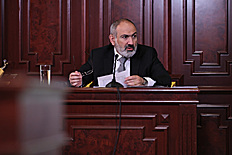 1670x1113px - 384 Kb
1670x1113px - 384 Kb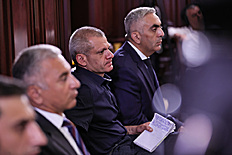 1670x1113px - 320 Kb
1670x1113px - 320 Kb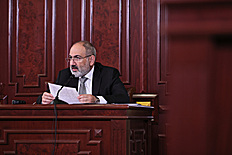 1670x1113px - 406 Kb
1670x1113px - 406 Kb 1670x1113px - 405 Kb
1670x1113px - 405 Kb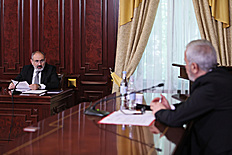 1670x1113px - 534 Kb
1670x1113px - 534 Kb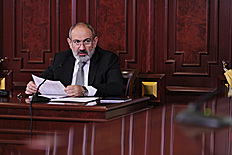 1670x1113px - 446 Kb
1670x1113px - 446 Kb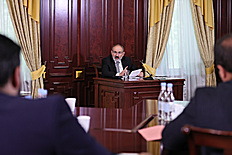 1670x1113px - 542 Kb
1670x1113px - 542 Kb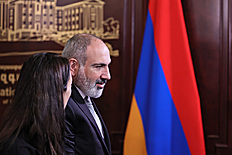 1670x1113px - 429 Kb
1670x1113px - 429 Kb
more 20 photos
Dear Chairman of the Commission investigating the circumstances of the 44-day war of 2020,
Dear members of the Commission,
I have to be honest, I have been waiting for this meeting for a long time, because though I have said a significant part of what I have to say today on different occasions, this is perhaps the best opportunity I have to comprehensively talk about the history of the negotiation process of the Nagorno-Karabakh conflict, the 44-day war of 2020, the circumstances related to the signing of the trilateral declaration of November 9, 2020 through a speech and question-and-answer session.
One clarification, Mr. Kocharyan, you said that I will present all the information I have, let me say that it is not possible to say it in one speech. Today I will just give an opening speech and of course I am ready to share all my information. And I will do it not only through a speech, but also by answering the questions.
I also consider the decision to carry out this investigation in public important. Of course, this approach cannot be considered perfect, especially in the sense that it’s also available for the external world, however, the best public interest implies continuous public communication about one of the most difficult pages in our history, the 44-day war and the negotiation process for the settlement of the Nagorno-Karabakh conflict, because fully understanding what happened with us, not only during the 44-day war, but also throughout the negotiation process of the NK issue, the public will have a clearer picture of the challenges of the present and future and the adequacy of the government's actions in terms of managing those challenges. After this speech, as said, I will answer the questions of the Investigating Commission and I propose to do it publicly as well. If there will be episodes that I will consider impossible to answer publicly due to national security reasons, I will ask to discuss them behind closed doors.
Dear attendees,
Dear people,
On November 9, 2020, I signed the trilateral declaration of the President of the Russian Federation, the President of Azerbaijan, and the Prime Minister of Armenia on stopping the second Karabakh war.
First, I want to answer the question why I signed the document and why the war stopped on November 9. Here, of course, the process of Shushi's fall played a decisive role. Not only Shushi's symbolic value, but also its strategic value are important here. After the loss of Shushi, in fact, Stepanakert would be under attack, the pressure on Martuni, Nagorno-Karabakh would inevitably increase, and most importantly, about 25 thousand of our soldiers would be in danger of being surrounded. I talked about this in detail in my TV message of November 12, 2020.
Before clarifying Shushi's question in more detail, I must emphasize that the declaration of November 9, 2020 was already our fifth attempt to stop the war.
The first conversation on that issue took place on October 7, when I called Russian President Vladimir Putin to congratulate him on his birthday. After the congratulatory conversation, the Russian president considered it important that I stated in one of the interviews that Armenia is ready to make compromises and that he wants to use this opportunity to make mediation efforts to achieve a ceasefire as soon as possible. I said that I agree, having already inquired about the terms of the ceasefire.
Our understanding was that the fire should cease without preconditions, the parties should remain in the positions they occupied at that moment, after which consultations should begin on what compromises the parties are ready for. I said that this option is acceptable for us.
The same day, in the evening, I had the second telephone conversation with the President of the Russian Federation and he said that he had spoken with the President of Azerbaijan, who said that he is not ready for a ceasefire, that is, he did not agree to establish a ceasefire. Still, Vladimir Putin said he had agreed to speak with Ilham Aliyev again the next day.
The next day, the Russian president informed me that the Azerbaijani side has a precondition for a ceasefire: they expected Fizuli to be surrendered without a fight and the Armenian forces to retreat along the Aras River to the Khoda Afarin Dam, so that the dam appears under Azerbaijani control and they can draw water from it for irrigation purposes. In addition, the leadership of Azerbaijan expected to get back Guliyev and Askerov, who were serving their sentence for murder and kidnapping in Artsakh, considering it possible to return Armenian prisoners.
Moreover, in response to all this, a ceasefire was not to be announced, but a humanitarian ceasefire to organize the funeral of the dead. After that, there should be no condition or obligation not to continue the military operations.
I said that preconditions are not acceptable, because we had agreed with the Russian president that the ceasefire should be established without preconditions and then, even if I agree to the withdrawal of troops, there is no guarantee that Azerbaijan will not continue the attack during the withdrawal. However, I showed some flexibility by stating that the joint use of water from the Khoda Afarin Dam is possible, that is, NK, I think, will not prevent Azerbaijan from taking water from the dam, the condition of the return of Askerov and Guliyev can be discussed, if Azerbaijan tells how many Armenian prisoners are going to be returned to the Armenian side, the condition of surrendering Fizuli without a battle and retreating along the Aras coast is not acceptable, the proposal to establish a humanitarian ceasefire in order to bury the bodies of the dead is fully acceptable.
During our next conversation, which took place again on October 8, the President of the Russian Federation said that Azerbaijan agrees to establish a ceasefire from midnight October 9.
In order to discuss this, the Foreign Ministers of Armenia and Azerbaijan were invited to Moscow on October 9 to start consultations with the mediation of the Russian Federation. Also, captives and the remains of the dead had to be be exchanged. I agreed to this offer. After our conversation, the following statement was published on the website of the President of the Russian Federation.
"After several telephone conversations with Azerbaijani President Ilham Aliyev and Armenian Prime Minister Nikol Pashinyan, the Russian President appeals to stop the military operations in the Nagorno Karabakh conflict zone for humanitarian reasons.
With the mediation of the Ministry of Foreign Affairs of Russia, for holding consultations on these issues, the Foreign Ministers of Azerbaijan and Armenia are invited to Moscow on October 9”.
On October 9, a tripartite meeting of foreign ministers began in Moscow, which ended at night of October 10 with the following statement of the foreign ministers of the Russian Federation, the Republic of Armenia and Azerbaijan.
"In response to the message of the President of the Russian Federation V.V. Putin and in line with the agreements reached between the President of the Russian Federation V.V. Putin, the Prime Minister of the Republic of Armenia N.V. Pashinyan and the President of the Republic of Azerbaijan I.H. Aliyev, the parties agreed on the steps presented below.
1. Starting from 12:00, October 10, 2020, for humanitarian purposes, a ceasefire is announced for the exchange of prisoners of war and other detained persons, and exchange of the bodies of the victims with the mediation of the International Committee of the Red Cross and according to the latter's standards.
2. The exact parameters of the ceasefire will be agreed upon additionally.
3. The Republic of Armenia and the Republic of Azerbaijan, with the mediation of the Co-chairs of the OSCE Minsk Group, will start substantive negotiations based on the fundamental principles of settlement in order to reach a peaceful settlement as soon as possible.
The parties reaffirm that the format of the negotiation process remains unchanged."
This statement was acceptable to us, and naturally, after the statement was accepted, my instruction to the Ministry of Defense and the General Staff was to maintain the ceasefire regime. But after minor pauses, Azerbaijan not only did not maintain the ceasefire regime, but also intensified its offensive operations, launching an attack on the territory of the former Autonomous Oblast of Nagorno-Karabakh, launching rocket attacks on Stepanakert, Martakert, and attacking Hadrut. Of course, the troops were instructed to do everything possible to stop Azerbaijan's attack, but at the same time, diplomatic efforts were being made in accordance with the Moscow document to establish a ceasefire and maintain the ceasefire regime.
As such, the deployment of Russian military observers from both sides of the contact line, who would monitor the situation and record violations of the ceasefire regime, was considered. Azerbaijan, however, constantly avoided such a solution and intensified military operations.
In the following days, I had several telephone conversations with the President of the Russian Federation, the main topic of which was the following: how to achieve the establishment and maintenance of the ceasefire regime, what is needed to achieve it. I expressed my willingness to make the necessary efforts for this.
Analyzing the situation in our domestic discussions, my conclusion was as follows. Azerbaijan will not agree to a ceasefire unless the advance of Azerbaijani troops is stopped. This was, in fact, the balanced scenario for the cessation of hostilities, and I understood that if such a scenario could not be implemented, and the situation in the theater of war did not inspire optimism in this regard, then the only possible option remains the option of concession for the cessation of hostilities. Other options did not seem realistic, because days passed after Moscow's rather balanced announcement of a ceasefire, but as I described above, we were unable to establish ceasefire.
It was on October 13, 2020, when I asked the President of the Russian Federation for the first time to answer the following direct and unambiguous question: what should I do to establish a ceasefire, to stop the war? I had a more detailed discussion on the same question with Vladimir Putin on October 16, and the Russian president expressed the opinion that it is possible to try to talk about stopping the war in exchange for the return of 5 regions, of course, without any clarification of the status of Karabakh, that is, with the uncertainty of the status. On that day, we agreed with the President of the Russian Federation to instruct the teams to work on the crystallization of this idea.
On October 17, French President Emmanuel Macron took an initiative and informed me that the President of Azerbaijan agrees to establish a ceasefire without preconditions from midnight on October 18. Naturally, I agreed to this, and within a few hours, the following statement was agreed between France, Armenia and Azerbaijan, which was published late in the evening of October 17. "The Republic of Armenia and the Republic of Azerbaijan decided to establish a humanitarian ceasefire on October 18, at 00:00 local time.
This decision was made in continuation of the October 1 statement made by the presidents of the Co-chair countries of the OSCE Minsk Group, the French Republic, the Russian Federation and the United States of America, the statement made by the Co-chairs of the OSCE Minsk Group on October 5 and in accordance with the joint statement adopted in Moscow on October 10 ".
Regarding this statement, even before publication, we had consultations with our Russian partners, who welcomed the initiative. However, no ceasefire was established on October 18 either, despite the fact that throughout the day we made all possible diplomatic efforts to stop the war. In other words, after this statement, there was no pause at all.
Along with the failure of another cease-fire announcement, I returned to the conversation I had with the President of the Russian Federation on October 16. On the afternoon of October 19, I had a telephone conversation with Vladimir Putin, where he reaffirmed that it is still possible to try to stop the war under the conditions of the Russian plan developed years ago. And the condition is as follows: the 7 regions are returned in the 5+2 format, the issue of connection between Nagorno Karabakh and Armenia through the Lachin Corridor is resolved, Russian peacekeepers are stationed in Karabakh, the status of Karabakh remains undefined, and the issue remains for indefinite future.
We agreed with the President of the Russian Federation that I will express our position by the evening. In the afternoon, I first invited the representatives of the extra-parliamentary forces, later I called a meeting of the Security Council with the participation of the President of the Republic, the Catholicos of All Armenians and the representatives of the parliamentary forces, where I said that I was going to call the President of the Russian Federation and say that I accept the proposed version. Moreover, as I said, I did not expect that any of the invited persons would share the responsibility for that decision with me. I was just keeping them informed about the processes taking place.
I remember my words at that meeting. During the meeting with the representatives of the extra-parliamentary forces, I said that I invited them because I consider that by informing them, I am also informing the public. Because I want the public to be aware of what is happening, phone calls several times a day, etc., but I cannot go on the air and tell people all that. Individuals representing various circles were present, there was no place to sit in the hall, maybe 25-30, maybe more representatives of political forces, then a meeting of the Security Council took place. I said I was doing this just to inform the public, not to invite someone to share the responsibility with me. This is an important nuance.
In the evening, I called and told the Russian president that I am ready to stop the war under such conditions. The President of Russia said that he will talk to the President of Azerbaijan and call me. At that time, two of the 5 regions in question, Fizuli and Jabrayil, were practically completely or mostly under the control of Azerbaijan.
The Russian President called the next day, on the morning of October 20. And, in fact, conveyed the following. Azerbaijan is ready to stop the war, but expects to get all 7 regions, or rather the remaining 5 regions, because two of them, Fizuli and Jabrayil, as I said, were already under their control. But this was not all.
It was on this day that the episode, which was most discussed and criticized after November 9, 2020 appeared, that allegedly there was an opportunity to stop the war with Shushi under Armenian control, but I missed it. So, on October 19, 2020, the Russian president told me that the Azerbaijani side has one more condition. It expects guarantees that Azerbaijani refugees, who, according to the Azerbaijani side, made up 90 percent of Shushi's population before the conflict, return to Shushi. For the Russian side, this was an understandable proposal, because they said that the return of refugees and internally displaced persons to Nagorno Karabakh had always been included in the settlement plan of the Karabakh conflict, which had been on the table for many years.
This is the reason why, after November 9, I announced from the National Assembly that the issue of Shushi had always been on the negotiation agenda, because if it is said that Azerbaijanis should return to Nagorno Karabakh, is there a need to clarify that they will return to those settlements in which they used to live before?
So, what are they accusing me of? That if I agreed for the Azerbaijanis to return to Shush, it would remain under Armenian control, and even though populated by Azerbaijanis, it would be Armenian. To be honest, that wording itself is problematic, but when Shushi's question came up, I tried to find out what the expected guarantees of Azerbaijanis would look like according to the proposed version. And as a result of that conversation, it turned out that I have to declare that I agree with the return of Azerbaijani refugees to Shush and other settlements of Karabakh.
The President of Russia suggested that this issue should be interrelated with the status of Nagorno Karabakh, that is, the issue of the return of Azerbaijanis of Nagorno-Karabakh Autonomous Oblast is resolved in the context of the issue of the status of Karabakh, together with the supposed decision on it. I agreed to this wording, but the Azerbaijani side, as before, rejected it, saying that it was not ready to discuss any issue related to the status.
Moreover, according to the proposal made at that time, not only Azerbaijanis having lived in Shushi should have direct and unhindered access to Shushi, but also all Azerbaijanis.
Let's say, for example, 50,000 Azerbaijanis can visit Azerbaijanis living in Shushi, the number of which we don’t know, and there cannot be any restrictions here. In fact, they can go and stay.
But the most important question was about ensuring their movement. It turned out that, for example, a new road connecting Shushi to Azerbaijan would have to be built so that Azerbaijanis would not have to use the Lachin Corridor or any other existing road to reach Shushi.
That road could pass, for example, through Kubatli. That is, according to Azerbaijan's proposal at the time, Shushi was to have at least 95 percent Azerbaijani population, in fact, with no further restrictions for their increase or controls, they were to have a separate road connecting Shushi to Azerbaijan, which was to be out of the Lachin Corridor and under their control. This means that there could also be Azerbaijani armed units there, which in turn means that without exaggeration, it was about handing over Shushi to Azerbaijan.
One of my practical reasons for not accepting this offer at the time, however, was the following: it meant that the Lachin Corridor would not work, because the Azerbaijanis could close it at any time, because Shushi itself would not be included in the Lachin Corridor, and the Lachin Corridor would pass a few meters next to Shushi. Recent events have borne out my prediction of that time, under circumstances known to you all.
But even this was not all the talk of October 19. In the context of the proposal of that day, a new idea was also voiced as an additional condition for ending the war: peacekeepers should be deployed not only in Karabakh and along the Lachin Corridor, but also in Meghri to ensure the communication of the western regions of Azerbaijan with Nakhichevan. I didn't agree to that either. I did not agree to the creation of a corridor in the territory of the Republic of Armenia out of the control of the Republic of Armenia, saying that I agree with the road, but not with the corridor. In other words, my position, like now, was before, that I think that yes, the roads should be opened, yes, the western regions of Azerbaijan should have the possibility of communication with Nakhichevan, but it cannot be a corridor, and it should be under the sovereignty and jurisdiction of the Republic of Armenia.
Thus, in the context of the October 19 proposal, the conditions for stopping the war were as follows.
1. All 7 regions come under the control of Azerbaijan. The question of the status of Nagorno Karabakh is left uncertain. The territories of Nagorno Karabakh Autonomous Oblast that were already lost at that time remain under the control of Azerbaijan, and at that time significant territories of Nagorno Karabakh Autonomous Oblast were already under the control of Azerbaijan.
2. Shushi, in the scenario described above, is handed over to Azerbaijan.
3. Peacekeepers are stationed in Meghri and a corridor is actually created, that is, a layer not under our control, connecting Azerbaijan to the Autonomous Republic of Nakhichevan.
I could not agree to such conditions, irrespective of the fact that I understood the gravity of the situation. Now looking back, I would not agree again. If anyone says they would agree, let them say it out loud.
However, attempts to stop the war continued, and on October 23 an American initiative to reach a new cease-fire agreement emerged. The statement was agreed upon only on October 25. It was about establishing a ceasefire from 08.00 in the morning on October 26. The text of the statement was as follows:
"On October 24, Armenian Foreign Minister Zohrab Mnatsakanyan and Azerbaijani Foreign Minister Jeyhun Bayramov met with US Deputy Secretary of State Stephen Bigan and reaffirmed their countries' commitment to reach and maintain the humanitarian ceasefire agreements reached in Moscow on October 10 and reaffirmed on October 17 with Paris statement, in line with the statement made by US President Donald Trump, French President Emmanuel Macron and Russian President Vladimir Putin on October 1.
The humanitarian ceasefire will enter into force on October 26, 2020 at 08:00 local time.
The United States promoted intensive negotiations between the foreign ministers and the Co-chairs of the Minsk Group in order to bring Armenia and Azerbaijan closer to the peaceful settlement of the Nagorno-Karabakh conflict."
This ceasefire agreement was also not maintained, understandably by Azerbaijan. Usually, after the announcement of a cease-fire, the intensity of combat operations decreased for a short time, sometimes there were even short pauses, but generally, after a few hours, Azerbaijan resumed the attack in full scale.
In 90 percent of the front line, our troops successfully resisted the attacks, but we had the most serious problem in the 9th defense district, the defensive line of which had been broken through the enemy on October 4, reaching the vicinity of Jabrayil. The task of the army was to stop the attacks of Azerbaijan, to prevent its advance, because the above-described attempts to stop the war showed that unless we are able to stop the Azerbaijanis, all attempts to achieve a cease-fire will be futile. Or we would have to make painful concessions. All previous attempts to stop the war had shown just this, and that is why on October 26, 2020, on my Facebook live, I spoke about the painful compromises.
But even though I understood the potential need for painful compromises, Shushi and the deployment of peacekeepers in Meghri was a red line for me. On the other hand, as long as Shushi was standing, the fight had a very specific purpose and motivation. On the other hand, it was obvious from the above-mentioned negotiations that the next goal of Azerbaijan is Shushi. Again, not only for symbolic reasons, but also because by taking Shushi, the Azerbaijanis blocked the road to Lachin, they got the opportunity to attack Stepanakert and to attack the Defense Army's 2nd, 3rd, 4th, 5th, 6th, 7th defense districts not only from the front, but also from the rear, as well as Haterk-Sotk section.
Looking back at the story behind Shushi's fall, I can say the following: realizing that the cornerstone importance of Shushi was further emphasized, all instructions were to fortify Shushi, to organize the defense of Shushi. Finally, there was the impression that everything necessary was done. But not long after those preparatory actions, news came that a group of Azerbaijanis broke through our defenses in the area of Zarisli village and stood on the Lachin-Stepanakert road, that is, in fact, blocked the road.
The President of Nagorno-Karabakh gave me the news, but the General Staff of the Armed Forces did not confirm this information. By the way, this was a situation repeated about a dozen times during the war, when the Artsakh President reported the news, the General Staff did not confirm the news, even denied it, and after some time was forced to admit that the information given by the Nagorno-Karabakh President was correct. This was the case again, when the news came that the Azerbaijanis shot at a civilian car moving on the Stepanakert-Lachin road.
In fact, this is where Shushi's creeping decline began. There were constant worrying news from Shushi. Information began to arrive that the first group of the enemy had entered Shushi, then the second, and so on. In the end, on the afternoon of November 7, the Chief of Staff of the General Staff, Onik Gasparyan, reported to me about the fall of Shushi. Even though I was aware of the negative dynamics of Shushi's situation, this was hard news for me, because in all my conversations, instructions, orders, consultations, I said that Shushi must be kept. And I was assured that it would be kept. Upon hearing the news of Shushi's fall, my first reaction was demanding to do what they promised. I mean, to keep Shushi. Keep Shushi, take it back. Eventually I was told about countermeasures, then some success, then they said the operation was going well, then we were inside Shushi. Up to the signing of the trilteral declaration, I was told that part of Shushi was under the control of the Defense Army. Then there was the signing of the trilateral declaration, then the attack on the government building on the night of November 10, and when I returned to full-time work a day or two later, I was told that we had no soldiers in Shushi.
Criminal cases related to the episode of the fall of Shushi, as well as other circumstances of the war, have been initiated, and these circumstances are still waiting and should be thoroughly clarified.
The negotiations on the signing of the trilateral declaration began on November 6, that is, the text of this declaration itself. I agreed to begin negotiations on that issue, essentially on the condition that there would be no provisions regarding Shushi and the corridor through Armenian territory, and also proposing that we return the Aghdam region in exchange for the Hadrut region that Azerbaijan had taken control of. This was the beginning of the process towards signing the trilateral declaration. I understood that we have reached a turning point. if we are able to keep Shushi, it's a turning point, if we fail to do keep Shushi, that's a turning point too.
But as of November 8, even though I was told that a part of Shushi was under our control, I understood that we will no longer be able to get it back completely. The President of Nagorno-Karabakh warned about the vulnerability of Stepanakert, and there was a possibility that the Azerbaijanis, having practically solved the Shushi issue, would launch an attack on Stepanakert from the Shosh village, continue to Askeran, and from there hit the defense districts of the Defense Army from behind and enter the Haterk-Sotk sector from the rear.
I conducted the negotiations through the President of the Russian Federation (I had about 20 phone conversations with him on November 8 and 9, about 60 phone conversations during the entire 44-day war), and it quickly became clear that Azerbaijan does not accept the proposal of Aghdam in exchange for Hadrut, and in the end, as a result of the discussions, we reached a text where nothing was said about Shushi, nothing was said about creating a corridor through the territory of Armenia, but it was about the cessation of hostilities, the return of 7 regions, the creation of the Lachin corridor, the deployment of Russian peacekeepers there and in Nagorno Karabakh. On the morning of November 9, I signed that text. That is, on the morning of November 9, pay attention, not at midnight, but on the morning of November 8-9, I signed the text of the trilateral declaration.
However, it turned out that Azerbaijan does not sign the text and puts forward a number of new demands.
The culmination of the process was the evening of November 9, when it turned out that Azerbaijan was proposing new additions to the practically agreed text. In other words, during the day that signed text went out of circulation, during the day there were constant discussions, different agreements, but at the end of the day it turned out that new additions to the text are proposed. This meant that the text I had signed in the morning was no longer valid. But at the moment when the President of the Russian Federation said that Azerbaijan proposes to add a point to the text about the return of the enclaves of the Tavush region, I announced that it’s ruled out that I sign such a document. And it was officially recorded that we are not signing a document. After some time it turned out that an agreement was reached to remove that point from the document. At the same time, at around midnight, news began to arrive about the intensification of military operations and the presence of a large number of drones in the sky of Stepanakert. In the end, after long and complicated discussions, I signed the document that you all know, which was, of course, worse than the version of the morning, but better than the other proposed options, one of which provided for the Meghri Corridor, the other for the return of the enclaves of the Tavush region.
Information about the signing of the trilateral declaration was released a while after the document was signed, and military operations had largely ceased at the time of publication. But not long after the signing of the document, the state buildings in Yerevan were attacked, particularly the Government House, the National Assembly and the government residence. The President of the National Assembly was attacked.
I think there is no need to focus on the subject of these attacks today, because our main task is to understand what brought us to the 44-day war.
Could we have avoided war and if so, how? So, could we have avoided the 44 day war? Most likely, yes, if the Karabakh issue had been solved during the previous 25 years. But here an important question arises. Did we want to solve the Karabakh issue?
Parallel to this, there is a much more fundamental and profound question. Could we have solved the Karabakh issue and if so, how?
There is a need, then, to discuss the history of negotiations, the key points of which I will now touch upon.
In fact, the negotiation process and its content were directly related to the internal political situation and developments of Armenia. No matter how natural this was, but it played the most negative role on the settlement of the Karabakh issue, because in our internal political life, after the victorious cease-fire of May 12, 1994, there has been a great deficit of positive events.
When thinking about the history of the settlement of the Karabakh issue, one of the first circumstances that comes to mind is the OSCE Lisbon Summit, the First President of the Republic of Armenia Levon Ter-Petrosyan's article published on November 1, 1997: "War or peace? Time to get serious", where Ter-Petrosyan talks about the need for compromises. If we summarize what Ter-Petrosyan said, we get the following:
1. The status quo cannot be maintained for a long time.
2. Let's not engage in self-deception and cherish empty illusions, we have no allies in the matter of Karabakh's independence.
These are essentially quotes from the article.
Therefore, according to Ter-Petrosyan, we should focus on another issue: to ensure that Karabakh remains inhabited by Armenians in the coming millennium. The interesting thing is that, saying this, Ter-Petrosyan does not give a clear and precise answer to a question in that article: what status will Nagorno Karabakh have in the end? will it be independent, will it be within Armenia or Azerbaijan? By the way, it's interesting that literally there is really nothing about this in that article.
This article of Ter-Petrosyan received intense opposition among the public-political elite. We cannot say anything about the people, because in 1997 there did not seem to be any concrete manifestations of popular opinion. In fact, however, Ter-Petrosyan's article was another link that strengthened our entanglement in the Karabakh issue, for several reasons. First, exactly one year before the publication of the article, Ter-Petrosyan participated in the presidential elections with the motto "Victory, stability, progress", but a year after those elections with questionable legitimacy, he was talking about peace and not victory.
7 years and 11 months before that article (December 1, 1989), the Supreme Council of the Armenian SSR and the National Council of Nagorno-Karabakh had made a joint decision on the reunification of Armenia and Nagorno-Karabakh.
7 years 2 months 9 days before that article (on August 23, 1990) the Supreme Council of Armenia "based on the joint decision of the Supreme Council of the Armenian SSR and the National Council of Nagorno Karabakh of December 1, 1989 on the reunification of the Armenian SSR and Nagorno Karabakh" had declared the process of independence of the Republic of Armenia.
6 years 1 month 10 days before that article (on September 21, 1991) the independence referendum of Armenia had taken place, by which the independence process of Armenia was de jure completed.
6 years 1 month 29 days before that article (September 2, 1991), Nagorno Karabakh had declared its independence.
6 years 1 month and 9 days before that article (on December 10, 1991), an independence referendum had been held in Nagorno Karabakh, by which the independence process of Nagorno Karabakh had been de jure completed.
But what happened next is also important. In the article "War or peace" Ter-Petrosyan writes: "If I was striving for personal glory or heroism, I would not have participated in the 1996 elections, remaining in the eyes of generations as the president who won independence, won the Karabakh war, expanded the Armenian territories, regardless of how fair it would be to attribute all that to me. It would not bother me what would happen after that and who would be responsible for the deterioration of the situation. All the same, my reputation would not suffer from it, but on the contrary, perhaps it would benefit more. I repeat, from a personal point of view, perhaps that was the best solution for me, but it would be nothing but a narrow-minded desertion, which, unfortunately or fortunately, I am not used to."
Three months and three days after the publication of this article and these words, Levon Ter-Petrosyan resigned from the post of the President of the Republic of Armenia, writing in the article of November 1 that six persons have expert knowledge of the Karabakh issue: Arkadi Ghukasyan, Robert Kocharyan, Alexander Arzumanyan, Vardan Oskanyan, Zhirayr Liparityan and Ter-Petrosyan himself.
And what expert information did the above-mentioned figures possess? By and large there were no secrets because all the secrets were formulated in public documents, which were, however, not directly available for the public at the time (because the Internet and social networks did not exist then), abut it was not that the public knew nothing about them. Now I will list the documents I am speaking about that were published. Of course, there were also documents that were classified, but for understanding at an expert level, there were a number of important documents that were public. They were public, but people couldn't have access to that document. Today, all documents can be downloaded from the Internet in just two seconds. At that time, as I said, there was no Internet, there were no social networks. Therefore, the experts did not simply voice expert assessments and did not say that during the first Karabakh war, more specifically, the 4 resolutions of the UN Security Council adopted in 1993 record the occupation of 7 regions of Azerbaijan by Armenian forces. I will now use the wording of those resolutions: they demand the immediate and unconditional withdrawal of troops from those territories, they consider it inadmissible to use force to acquire territories, they call Nagorno Karabakh a region of the Azerbaijan Republic. Here, those resolutions are not just pieces of paper, and it will not be easy to forget them and that what happened at the OSCE Lisbon summit in December 1996, even though it had no legal force, it was the position of the international community, which recognizes the territorial integrity of Azerbaijan and provides high autonomy for Nagorno Karabakh within its borders.
This Lisbon protocol was made by the international community not in the form of a resolution adopted by the OSCE summit, but in the form of a statement by the acting chairman of the summit, which was published as an appendix on December 3, 1996, together with the documents of the Lisbon summit. The problem is that the OSCE did not adopt the resolution with the same content because of the veto used by Armenia, because the decisions in the OSCE are made by consensus, that is, all members without exception must be in favor, if at least one is against, the decision is not accepted. And Armenia was the only OSCE member country that opposed the document.
And here, after Armenia's non-joining and disagreement with the resolution, the other OSCE countries, i.e. all the others, considered it necessary to authorize the then OSCE Chairman-in-Office to make a statement with the same content, and the chairman also records in his statement that the principles mentioned in the statement are supported by all OSCE member countries, except from Armenia: By the way, 4 of the 5 permanent members of the UN Security Council, all countries that are OSCE Minsk Group members and OSCE Minsk Group Co-chair countries were in the list of those OSCE member countries.
The above-mentioned statement of the OSCE Chairman-in-Office of December 1996, which, as we are convinced, expressed, in fact, the point of view of the entire international community, deserves more attention in the context of the topic we are discussing now for the following reason: the problem is that this statement protects not only the territorial integrity of Armenia and Azerbaijan, but also the right to self-determination of Nagorno-Karabakh.
Pay attention to that the December 1996 statement of the OSCE Chairman-in-Office, which, as you saw, expressed the opinion of the entire international community, protects not only the territorial integrity of Armenia and Azerbaijan, but also the right to self-determination of Nagorno-Karabakh. The statement says that the legal status of Nagorno-Karabakh should be determined on the basis of the right to self-determination, which would give it a status with high autonomy within Azerbaijan. In other words, we record that the OSCE, the international community, essentially says that the issue of Nagorno-Karabakh should be settled on the basis of the right to self-determination, don’t we? And the realization of that right to self-determination will give Nagorno-Karabakh a high degree of autonomy within Azerbaijan. This episode of the statement made in December 1996, I think, is news for the Armenian public. But in fact, back in 1996, the international community, including 4 of the 5 permanent members of the UN Security Council, the Co-chair countries of the OSCE Minsk Group, expressed this position, which was not adequately covered by us either at the public or expert level. I'm sure this information is just news to many, including experts. News that was published in December 1996.
That news is that as a result of the application of the principle of self-determination, Nagorno-Karabakh can get high autonomy within Azerbaijan.
The experts also did not say that Armenia itself took part in the adoption of documents recognizing the territorial integrity of Azerbaijan, and this happened as follows: the Republic of Armenia, as well as the Republic of Azerbaijan, joined the famous Belovezha Accords of December 8, 1991, on the creation of the Commonwealth of Independent States, the 5th article of which clearly states: " The High Contracting Parties acknowledge and respect each other's territorial integrity and the inviolability of existing borders within the Commonwealth.."
This agreement was ratified by the parliaments of both Armenia and Azerbaijan. The wording about territorial integrity and the inviolability of existing borders was also included in the Almaty Declaration of December 21, 1991, which was adopted by the newly independent countries that founded joined the CIS, including Armenia and Azerbaijan.
It should be noted that both the agreement and the declaration also mention the right to self-determination, the agreement talks about the protection of human rights, including the rights of national minorities. And these are important factors, because above we have already seen how self-determination was interpreted at the OSCE level in the case of NK, and we will have to see what kind of developments took place at the OSCE Istanbul Summit in 1999 and how the negotiation architecture of the settlement of the Nagorno-Karabakh problem was built, we will have to see what at least most of those who have expert knowledge of the Karabakh issue did not tell the public and why.
And so, as a result of the resignation of Levon Ter-Petrosyan on February 4, 1998, the power passes to Robert Kocharyan, who possesses expert knowledge of the Karabakh issue, who resigning from the post of the NKR president a year before, had been appointed the Prime Minister of the Republic of Armenia.
However, Kocharyan's role in this process has two sides: on the one hand, he has an expert knowledge of the Karabakh issue, on the other hand, he considers the path announced by Ter-Petrosyan's article, or more precisely, by the press conference held a month before, to be defeatist.
And this is a very interesting point, because during the rule of Robert Kocharian, the gap between the internal Armenian and international communication carried out by the Armenian authorities on the issue of Nagorno Karabakh is getting bigger. That is, there is a communication with the international community and a communication with the domestic public, and we see these two communications flowing in two different channels, and the gap is widening. In Ter-Petrosyan's case, this was reflected, perhaps not so highlighted, with the significant conceptual gap between the pre-election motto "Victory, stability, progress" and the article "War or peace? the moment to get serious", which Ter-Petrosyan tries to fill after the unsuccessful presidential elections and the Lisbon summit with the following sentence recorded in the article of November 1, 1997: "Unfortunately, Karabakh won not the war, but the battle."
But Robert Kocharyan, considering Ter-Petrosyan's approach as a defeatist, taking the leadership of the victorious direction in the negotiation process of the Karabakh issue, nevertheless takes steps that crystallize the architecture that was built by the founding documents of the CIS, the resolutions of the UN Security Council and the 1996 OSCE Lisbon Summit, whose Chairman's statement clearly stated that the Karabakh issue should be resolved within the framework of Azerbaijan's territorial integrity, and the right to self-determination of NK should also be realized within the framework of Azerbaijan's territorial integrity.
So what is Robert Kocharyan doing after appearing in the post of the acting president of Armenia and then the president? He deprives Nagorno Karabakh of the status of a participant in the negotiations, that is, after Kocharyan became the president of Armenia, the representatives of Nagorno Karabakh no longer participated in the negotiations, while before that they fully participated.
That Nagorno Karabakh was a full party to the negotiations at the time of Robert Kocharyan's becoming the president of Armenia is also proven by the fact that the OSCE Minsk Group Co-chairs presented that the so-called "Common State" package for the settlement of the Nagorno Karabakh conflict in November 1998 not only to Armenia and Azerbaijan, but also to Nagorno Karabakh. At that time, Robert Kocharyan had been the president of Armenia for 5 months. But this was the last package that was presented to Nagorno Karabakh by the Co-chairs. After that, no package was presented to Nagorno Karabakh. In fact, Nagorno-Karabakh was not even normally informed about what the negotiations were about.
And that the removal of Nagorno Karabakh from the negotiation process took place at the initiative of Robert Kocharyan were testified by
1. OSCE Minsk Group French Co-chair Bernard Fassier, who on October 2, 2009, during his visit to Stepanakert, announced that "the participation of the representatives of Karabakh in the negotiation process was terminated by the decision of the Armenian side."
2. The Minister of Foreign Affairs of the Russian Federation Sergey Lavrov, who on November 11, 2019, announced during a joint press conference with the Minister of Foreign Affairs of the Republic of Armenia Zohrab Mnatsakanyan in Yerevan: "At an earlier stage, when military operations were stopped, Nagorno Karabakh was a participant in the negotiations, but at some stage one of the former presidents of Armenia decided that the interests of Nagorno Karabakh should be represented by Yerevan."
3. Levon Ter-Petrosyan announced during the 2012 parliamentary election campaign. "Robert Kocharyan, with the tacit agreement or full agreement of Arkady Ghukasyan, excluded Karabakh from the negotiation process and began to speak officially on behalf of Karabakh. Robert Kocharyan could not have given a bigger gift to the international community and especially to Azerbaijan. Robert Kocharyan and Arkady Ghukasyan destroyed the greatest achievement of Armenian diplomacy."
4. Robert Kocharian himself testified about this, on April 3, 2004, while answering the questions of the readers of "Golos Armeni" newspaper, he referred to Karabakh's exclusion from the negotiation table, saying the following. "An impression was created that Armenia is ready for any form of settlement, but the problem is Karabakh, or rather, the leadership of Karabakh. A question arose. Isn’t Armenia capable to exert pressure and force to agree with this or that position in the conditions of Karabakh's obvious dependence on it? I proposed to change that point of view and try to use the resource of Armenia to develop its own position and approaches regarding the settlement of the problem. That is, not "we agree to any form of settlement that Karabakh will agree to", but we have our own position and are ready to assert it. After I was elected, I did exactly that."
With this position, by the way, Robert Kocharyan committed a gross violation of the fundamental legislation of Nagorno-Karabakh, for the simple reason that in the referendum of December 10, 1991, the people of Karabakh answered "Yes" to the following question. "Do you agree that the declared Nagorno-Karabakh Republic should be an independent state, independently determining the form of cooperation with other states and unions?" In fact, Robert Kocharyan deprived Nagorno Karabakh of any independence. And thus violated the will of the people of Nagorno Karabakh.
Moreover, he deprived Nagorno Karabakh of the only internationally recognized status, the status that gave it the opportunity to sit at the same table with the representatives of Russia, USA, France, Azerbaijan, Armenia as a party to the conflict and negotiation process.
This, in fact, was the end of Nagorno Karabakh as an international entity. Perhaps the only international achievement we had in the Karabakh issue was squandered.
Here, perhaps, it is worth dwelling on the reasons for Robert Kocharyan's such behavior. Why, with what purpose and motivation did he leave Karabakh out of the negotiation process? The reason, in my opinion, is obvious. Kocharyan won the 1998 presidential election amid widespread reports of fraud. In addition, he did not have the right to be nominated as a candidate for the President of the Republic of Armenia, because he had not been considered a citizen of the Republic of Armenia for the past ten years and had not permanently resided in Armenia for the past ten years, which was a mandatory condition to be nominated as a candidate for the President of the Republic of Armenia. It can be said that Kocharyan took the position of the President of Armenia in the conditions of complete lack of legitimacy.
He sacrificed the only internationally recognized status of Nagorno Karabakh in order to gain international legitimacy, so that the international community would turn a blind eye on the fact that he seized power in Armenia. And why did the international community need to leave Karabakh out of the negotiation table? First of all, because the negotiation format became simpler with this, and instead of negotiating with three entities, the international community could negotiate with two entities, both of which, being internationally recognized, were obliged to keep certain rules of the game. And Nagorno-Karabakh, not being an internationally recognized entity, behaved much more freely, international levers to put pressure on it, in fact, did not exist, and the presence of two Armenian sides at the negotiating table increased our flexibility.
But by leaving Karabakh out of the negotiation process, the story does not end, and as I have said many times, at the OSCE Istanbul summit held on November 18-19, 1999, the Charter for European Security was adopted, including by the "in favor" vote of Armenia, that is, Robert Kocharyan. In the section for human rights of the Charter we can read the following: " Full respect for human rights, including the rights of persons belonging to national minorities, besides being an end in itself, may not undermine, but strengthen territorial integrity and sovereignty. Various concepts of autonomy as well as other approaches outlined in the above-mentioned documents, which are in line with OSCE principles, constitute ways to preserve and promote the ethnic, cultural, linguistic and religious identity of national minorities within an existing State”.
Here we should see the connection with the documents related to the formation of the CIS, or rather, the collapse of the Soviet Union. If you remember, I described above that the CIS or former Soviet countries, including Armenia and Azerbaijan, recognized each other's territorial integrity and inviolability of borders. This is the main record of those documents. But as you remember, there was also a reference to the rights of national minorities, there was talk of the right to self-determination, which was used by the Soviet republics to gain independence (it is important to note that the collapse of the Soviet Union took place, in fact, with the participation of all the entities that formed it and consent). So, how do the newly independent countries, which are already mostly OSCE members, treat this new situation?
Following the OSCE Chairman's statement based on the results of the Lisbon Summit of December 1996, at the OSCE Istanbul Summit in November 1999, the aforementioned protocol was included in the Istanbul Charter for European Security, where Armenia also voted. In other words, in essence, the Istanbul Charter continues the development of the logic of the 1996 Lisbon Summit. This becomes the de jure basis on which the Azerbaijani formulation known to all of us is built, which we know as the Azerbaijani formulation, according to which the right to self-determination must be realized within the framework of the principle of territorial integrity.
The opponents say that neither the founding documents of the CIS nor the European Security Charter are about the settlement of the Nagorno Karabakh issue. This is true, as, say, the Civil Code is not about the regulation of relations between this or that family. It is not written in our Civil Code that this code is about the regulation of the relationship between Paul and Peter. But when there is a problem, a contradiction or a contradiction between Paul and Peter, in order to clarify the issue, they or their lawyers start digging into the Civil Code and not only the Civil Code, the entire legal framework to understand what rules are defined there, based on which they can formulate their arguments and positions.
It is this nuance that is important to consider. And why is it important? So that arguments and positions are based on the "Civil Code", to be legitimate. And why is it important that they are legitimate? Because legitimate means understandable for all others, acceptable for all others, legal for all others, conforming to the rules developed by all others, conforming to the rules formed by your own participation. And even more so, if the rule was formulated with your participation, it means that you are committed to act in accordance with that rule, and keeping those rules is the basis of international relations. And is it not possible to change the rule? Of course, it is possible, but for that you need to have at least enough influence, economic-military influence. In order to change the rule, it is more important that you can justify your current position in accordance with the already existing rules, emphasize in your current argument the points that somehow relate to the existing rule, are consistent with it and not the other way around.
In this sense, the victory in the first Artsakh war was actually overshadowed by the four resolutions adopted by the UN Security Council between April 30 and November 12, 1993.
As I mentioned above, those resolutions state that the regions of Azerbaijan were occupied by Armenian forces, it is demanded to immediately and unconditionaly withdraw the troops from those territories the use of force to acquire territories is considered inadmissible, the Armenian forces are called occupation forces, and Nagorno Karabakh is called a region of the Azerbaijani Republic, the territorial integrity of Azerbaijan is recognized, the safe and dignified return of refugees and internally displaced persons of the occupied territories and Nagorno-Karabakh to their homes is required. If we try to present the wordings of the Security Council resolutions more practically, this means that from the point of view of the international community, the achievements recorded as a result of military operations could not be used in the future as a basis for the settlement of the Nagorno-Karabakh issue, and Nagorno-Karabakh is recognized by the international community as a region of Azerbaijan.
In the 1990s, pundits knew exactly these nuances, who understood that the success recorded by breaking the rules "is not counted", just as, forgive me for this rude comparison, a goal scored by breaking the rules is not counted in football.
Pundits knew, but were silent about that Armenia in Almaty voted for the document recognizing the territorial integrity and inviolability of newly independent Azerbaijan along the borders of Soviet Azerbaijan, and accepted that document, recognizing Nagorno Karabakh as part of Azerbaijan. They did not say not only for subjective reasons, but also for objective reasons. For example, it can be considered objective that saying this at the moment of victory and success is not only difficult, but can also lead to unpredictable consequences and chaos, subjective is that there would be questions and an accusation - why did you recognize it, and perhaps courage was needed to admit that at that time, in 1991, the course of the conflict was not yet clear, it was not yet clear how much we needed the principle of territorial integrity, and how much Azerbaijan needed it. It is not customary to talk about failure in the moment of success.
Probably, Levon Ter-Petrosyan embraced this rule, who in 1996 during the presidential election campaign relied on the euphoria of victory, but he said the bitter things when it was known that he was having difficulties in the position of the President of the Republic of Armenia after the illegitimate elections.
Perhaps he wanted to go away not because of the lie, that is, the fraud recorded in the presidential elections, but because of the truth. Bitter truth.
After intense public discussions of several months in 1997-98 and the coming to power of Robert Kocharyan, two realities about the Nagorno Karabakh issue were formed again in Armenia and Artsakh: reality for "narrow experts" and reality for "broad public".
Moreover, I do not use the term "narrow experts" by chance, since a "broad experts" reality was also formed. The "narrow experts" gathered the "broad experts" from time to time, invited them and convinced them that the negotiation process is proceeding in such a way that we are moving towards a pro-Armenian solution to the Karabakh issue. In turn, "Broad experts" created a good background for forming a "broad public" reality of the Nagorno-Karabakh issue.
And to those experts who understood what’s going on, that everything was not going so well, “narrow experts” "winked" and said that we are successfully delaying time. In fact, it was Azerbaijan who was delaying time, on the one hand becoming stronger militarily, directing billions generated from the sale of oil and gas to it, on the other hand, using diplomatic leverage, creating de jure or de facto favorable conditions and decisions for it.
And didn't the Armenian side have any diplomatic success during this whole period? Of course it had. The ceasefire announcement of May 12, 1994 is an example. But during the history of the conflict, our greatest success was the recognition of Nagorno Karabakh by the international community as a party to the conflict and thus also to the negotiation process. Nagorno Karabakh’s subjectivity could create at least a dim hope of a solution that is understandable for us. But the expulsion of Karabakh from the negotiation process shattered the hopes, even dim, of the implementation of the Armenian vision of the settlement of the issue.
Why? Because if Nagorno Karabakh is not a negotiating party, then it is not a subject either. If it is not a subject, then even the theoretical hope of making the Armenian interpretation of the right to self-determination internationally comprehensible, is jeopardized, because a natural question arises: who is the one that wants self-determination, and where is he? Is Armenia negotiating for Karabakh's right to self-determination? In all seriousness, pay attention to the word "self-determination." If the one that wants "SELF-DETERMINATION" HIMSELF does not negotiate, then it is not about self-determination, but something else, for example, a territorial dispute, and since 1998, the international community began to perceive the Nagorno-Karabakh issue just this way.
From this, of course, we can say that the right to self-determination did not vanish, but it can be applied as described in the results of the OSCE Lisbon Summit, in the statement of the OSCE Chairman-in-Office, or as it was applied in the USSR, Czechoslovakia, that is, with the agreement of the interested parties. And there is no entity named Nagorno Karabakh at the negotiation table of this issue. There is Azerbaijan and Armenia, and the latter disputes the status of Nagorno Karabakh.
Continuing the topic of leaving Nagorno Karabakh out of the negotiation process, or rather the related effects, it is important not only the fact itself, but also its consequences. I already mentioned some of that. But by leaving Nagorno-Karabakh out of the negotiation process, it turned out that functionally Armenia was the only one responsible for the implementation of the four resolutions of the UN Security Council of 1993, because the Armenian forces of Nagorno-Karabakh were accused of "territory occupation" in the resolutions, and Armenia was urged to use its influence over them to get them out of those territories. It is true, also at the cost being condemned, but Nagorno Karabakh became a subject of international relations, from which something was expected, easing the responsibility placed on Armenia. And by depriving Karabakh of the status of a party to the negotiations and the conflict, the accusations of the resolutions and the arrows of responsibility for responding to those accusations were pointed at Armenia. Since 1999, the Republic of Armenia has been at the negotiating table as the sole decision-maker on whether or not to return the 7 regions. That is, if, for example, regarding the issue of those 7 regions, no one could say anything to Armenia at the negotiating table in the previous format, because the Armenian side would say that there is Nagorno Karabakh, the forces of Nagorno Karabakh are carrying out the operations, so talk to them. Yes, we joint your calls, or we don't. Now Nagorno Karabakh is gone, and all the international pressure on that issue was automatically redirected to the Republic of Armenia. Therefore, Robert Kocharyan himself voluntarily created such, to put it mildly, unpleasant situation for the Republic of Armenia.
Due to also these developments, the Nagorno-Karabakh issue is slowly beginning to be perceived as a territorial dispute between Azerbaijan and Armenia, which was the most negative international understanding of the Nagorno-Karabakh issue. In other words, if someone wanted to create a more negative background for the NK issue, it was simply not possible. A more negative situation could not have been created.
But on the other hand, the study shows that it’s not so that Armenia found itself in such a situation completely unconsciously. The Lisbon events perhaps made it obvious that the concept of self-determination cannot ensure the separation of Nagorno-Karabakh from Azerbaijan, and perhaps for this reason it was decided to give the issue the characteristic of a territorial dispute as well, which, although in my opinion, was a gross mistake, because we willingly or unwillingly reaffirmed Nagorno-Karabakh being part of Azerbaijan, because if you say it is a territorial dispute between Azerbaijan and Armenia, you are taking another step for the benefit of recognizing it as part of Azerbaijan. But this was not enough, we questioned the territorial integrity of Armenia. In other words, a topic emerged: territory, Armenia, Azerbaijan, territorial dispute, etc.
This was expressed in 1998-99, when the "territory exchange" concept of settlement of the issue appeared on the negotiation table, according to which Armenia will give part of its territory to Azerbaijan in order to get Karabakh. This is nothing but an act of recognizing Karabakh as part of Azerbaijan, it is impossible to formulate it differently, because if you have to give a region from your territory to Azerbaijan in order to get Karabakh, it means that you recognize Karabakh as Azerbaijan, and you put your own territory up for bargaining. In other words, if Armenia does not recognize Karabakh as a part of Azerbaijan, why does it put its territory up for bargaining in order to take Karabakh?
Dear colleagues, dear people,
Here I have to return again to the Charter of European Security adopted at the Istanbul Summit of the OSCE in 1999. Previously, when I criticized Armenia's vote for the adoption of this charter, Robert Kocharyan or his office reacted to it. The reaction itself is very interesting, that is, on the contrary, the OSCE Istanbul summit is a victory for Armenian diplomacy, according to them, because in the declaration adopted there:
1) the conflicts of the post-Soviet territory are mentioned one by one and it is mentioned that they should be resolved based on the principle of territorial integrity, but the NK conflict is not mentioned in that list.
2) In the part of the Charter concerning the negotiation process for the settlement of the Nagorno-Karabakh issue, nothing is mentioned about the territorial integrity of Azerbaijan.
These are the reactions of Robert Kocharyan or his office.
The sound like really strong arguments. But what does that mean? The problem is that in that same paper there is nothing about the territorial integrity of not only Azerbaijan, but also Armenia. There is also nothing about self-determination. And the NK conflict, in this context, was separated from the conflicts of Abkhazia, South Ossetia, Transnistria and the principle of territorial integrity for a completely different reason, which I mentioned a little while ago. the problem is that at that time, in the context of settlement of the Nagorno-Karabakh issue, at the time of the Istanbul summit, another document was circulating, which was beyond the right to both territorial integrity and self-determination. on the one hand, it had nothing to do with the right to self-determination, on the other hand, it violated the principle of territorial integrity of both Armenia and Azerbaijan, and it was the document of the exchange of territories. In other words, can you imagine why in that summit there is no reference to either the territorial integrity, or the principle of self-determination, or the territorial integrity of Azerbaijan or Armenia, because in the meantime the community of international diplomacy knows that now a settlement document called the principle of territory exchange was put on negotiation table. And, I think, it is worth making a few key quotes from that document.
Principles of exchange of territories
"The Republic of Azerbaijan and the Republic of Armenia agreed on the following in order to resolve the conflict between them on a permanent basis, as well as to create the necessary conditions for independent national development and peace, stability and prosperity of their peoples and their region.
Article 1
After this Agreement enters into force, the territory of the former Nagorno-Karabakh Autonomous Oblast, Shushi region and Lachin region (within the borders of 1988, as indicated in Annex A) are transferred to the Republic of Armenia. After this Agreement enters into force, Meghri region (within the borders of 1988, as indicated in Annex A) is transferred to the Republic of Azerbaijan.
Article 2
The occupied territories of Aghdam, Fizuli, Jabrayil, Kubatli, Zangelan, Kelbajar, Ghazakh and Shahumyan (within the borders of 1988, as indicated in Annex A) are immediately transferred under the political and administrative control of the Republic of Azerbaijan.
Article 3
After this Agreement enters into force, all territories having no borders with their countries (enclaves) of any state are transferred to the state that surrounds them.
Article 4
Immediately after this Agreement enters into force, Armenia begins to withdraw its armed forces from all occupied territories of Azerbaijan, including Aghdam, Fizuli, Jabrail, Kubatli, Shahumyan, Kelbajar, Zangelan and Ghazakh regions. The withdrawal of military forces shall be completed within sixty days of the entry into force of this Agreement. The planning and implementation of the withdrawal and relocation of those forces will be carried out with the support of international observers, in accordance with the provisions of Articles 10-11.
Article 5
Immediately after the entry into force of this Agreement, the safe and voluntary relocation of the population of Meghri region and the Armenians currently living in the regions of Aghdam, Fizuli, Jabrayil, Kubatli, Zangelan, Kelbajar and Shahumyan to the territory of the Republic of Armenia will begin. This relocation shall be completed within sixty days of the entry into force of this Agreement. The planning and implementation of that relocation should be done under the supervision of the international observation mission, provided for by Articles 10-11 of this Agreement. First of all, Meghri region will be inhabited by citizens of Azerbaijan who were displaced as a result of the conflict. Each state is responsible for the relocation of its citizens and must cooperate with the other state and the international observation mission. Each state must ensure the protection of settlements and other infrastructures in the transferred regions, with the aim of preventing their dismantling, damage or destruction.
I do not publish the rest of the articles, that document is actually available on the Internet.
This document, in fact, records the death of Armenian fundamental concepts regarding the settlement of the Nagorno Karabakh problem. Moreover, there is an opinion, and I share that opinion, that Karen Demirchyan and Vazgen Sargsyan prevented the implementation of this document at the expense of their lives. Pay attention to the dates: Istanbul Summit, Territorial Exchange Document, etc., they are all taking place in the months of August, September, October, November 1999. No matter how much they deny those processes, there are specific people, there are specific testimonies, there is Vazgen Sargsyan's speech, there are memoirs, there is a witness, the then Minister of Defense of the Republic of Armenia gave an interview long before he was an official under our government, and he testified to that. It is true that the mentioned document was not accepted, it did not receive legal force, but such documents are formed as a result of discussions, conversations, debates with the parties and their once formulated content is no longer lost anywhere, and we all became convinced of this considering the above-mentioned narratives of the negotiation details of the 44-day war. Moreover, these are not just historical facts. I hope you saw these internal links. Enclave, Meghri, Shushi, which, as mentioned above, is excluded from the Nagorno Karabakh Autonomous Region. You saw those same topics in the November 2020 talks. Yes, it does not have legal force, but all those topics that were discussed at that time are again appearing on the negotiation tables. For 22 years, our society had heard almost nothing about all this, for a simple reason, because, as I said, there were two realities about the Nagorno-Karabakh issue: "narrow expert" and "broad public", which did not communicate with each other, which were opposite to each other, sometimes they did not even guess about each other’s existence.
The statement of the Chairman of the 1996 OSCE Lisbon summit also had no legal force, but it expressed the point of view of the international community, which was recorded step by step, drop by drop, in various international documents. Based on the results of the years of 1999-2000, Armenia and Artsakh found themselves between the teeth of the Armenian and international press machine of "narrow experts", and these teeth slowly, perhaps even more slowly than the steps of the tortoise, but the process of squeezing began.
Returning to the content of the negotiation process, we must record that in the end the above-mentioned document was reformulated into the Key West process after October 27, 2001, the key meaning of which was as follows: Armenia should give Azerbaijan not the entire Meghri region, but an extraterritorial corridor passing through it, instead receiving the Lachin corridor. Can you see the similarities of conversations of 20 years ago and 20 years later? In this version, the essential difference was that Nagorno-Karabakh would not be outside of Azerbaijan, but within Azerbaijan with the status of autonomy. This nuance is again not covered among us, because in order to somehow justify it within the concept of territory exchange, an attempt was made to present that Key West is actually about the independence of Nagorno Karabakh, but when we look at the publications of the most prestigious international press of that time and the leaks... In by the way, unfortunately, there are no archival documents, this is also another feature of the negotiation process. After becoming the prime minister, I myself worked for months to collect these pieces. Today I should have come to you with volumes and say that this is the first volume, this is the second volume, this is the third volume, this is the document. All that does not exist. What was revealed, I'm sorry, was revealed at different times in the form of leaks. But as you know, the parties did not agree on the Key West version either.
Dear Chairman of the Commission,
Dear members of the Commission,
Dear people,
For a complete understanding of the negotiation process and logic of the settlement of the Nagorno-Karabakh conflict, it is important to refer to the so-called "Common State" package of the negotiation history, which I already mentioned above. What is interesting here is that Armenia and Nagorno-Karabakh agreed to accept that package as a basis for negotiations, although Nagorno-Karabakh was supposed to be within the internationally recognized borders of Azerbaijan, that is, within Azerbaijan, and the residents of Nagorno-Karabakh had to carry Azerbaijani passports with a mark of Nagorno-Karabakh.
But Azerbaijan did not agree to accept that package as a basis for negotiations, because the high autonomy status of Nagorno Karabakh, which was offered by that package, seemed too high to Azerbaijan. But the key point here is that Robert Kocharyan, who came to power in 1998 against the backdrop of considering Ter-Petrosyan's positions on Nagorno-Karabakh as defeatist, began to discuss and accept such options that unequivocally recognized Nagorno-Karabakh as part of Azerbaijan, behind closed doors.
But this was happening in the negotiation documents, which were secret and away from the public eye, and in public communication, at the level of state propaganda, the opposite was going on. This is a very important detail that I would like to draw the attention of all of us. It was during this period that Armenian televisions, including the Public Television Company, began to use a unified map of Armenia, Nagorno Karabakh and 7 adjacent regions during weather forecasting. Such maps appeared in public places, even in state institutions, although no episode of the negotiation process ever suggested that at least the 7 regions surrounding Nagorno-Karabakh might not be returned to Azerbaijan. There was simply no such episode.
See what was happening behind the scenes in those times, now let's see what was happening on the public stage. Renaming of settlements was taking place: Fizuli became Varanda, Aghdam became Akna, Kubatli became Sanasar, Zangelan became Kovsakan, Jebrayil became Mekhakavan. Although, I repeat, in the entire history of negotiations, there was no episode when Armenia even questioned the inevitability of returning those territories to Azerbaijan. The same applies to Kelbajar-Karvachar and Lachin-Kashatagh with certain configurations.
So, captured (Levon Ter-Petrosyan's wording) or occupied (Vardan Oskanyan's wording) territories became liberated, liberated territories became motherland. But this was the case only on TV screens. At the negotiation table, Varanda remained Fizuli, Sanasar - Kubatli, Mekhakavan - Jabrayil, Kovsakan - Zangelan, Karvachar - Kelbajar, Kashatagh - Lachin, Akna - Aghdam. And on the ground, in the liberated or captured or occupied areas, mostly weeds grew, and in some places some generals grew grain, using the free labor of conscripts and the free equipment and fuel of the army.
And Nagorno-Karabakh, which was recognized as a part of Azerbaijan in one way or another throughout the negotiations, was never and would never be a part of Azerbaijan in the public discourse of Armenian officials, because, according to that perception, just as Azerbaijan became independent from the Soviet Union, so did the Nagorno-Karabakh Autonomous Region, gaining independent from the Soviet Union or Soviet Azerbaijan.
How did ii happen? Very simple. with the independence referendum of December 10, 1991. And this, in fact, was the official narrative of the Republic of Armenia for many years.
It is under these conditions that after Key West, the so-called Madrid principles developed little by little and were officially put on the table in 2007, which stated that the final legal status of Nagorno Karabakh would be determined by the future referendum.
With this favorable wording, the last stone was laid on the tomb of Nagorno Karabakh not being a part of Azerbaijan, because at the moment when Armenia and Azerbaijan agreed to accept the Madrid principles as a basis for negotiating the settlement of the Nagorno Karabakh issue, the results of the independence referendum held in Nagorno Karabakh on December 10, 1991, at least diplomatically and politically were nullified, for the simple reason that if the status will be determined by the referendum to take place in the future, then the status was not determined by the referendum that took place in the past, that is, the only meaning and purpose of the referendum, which was the determination of the status of Nagorno Karabakh, the establishment of independence, was nullified as a negotiating factor.
A very interesting question arises here. if the results of the referendum of December 10, 1991 are nullified, does it mean that the joint decision of the Supreme Council of the Armenian SSR and the National Council of Nagorno Karabakh of December 1, 1989 "On the reunification of the Armenian SSR and Nagorno Karabakh" remains in force?
The tragedy is that the Madrid principles nullify even the legal significance of that decision, because if the status of Nagorno-Karabakh will be determined by a future referendum, it means that that status was not decided even by the joint decision of the Supreme Council of the Armenian SSR and the National Council of Nagorno-Karabakh. And if according to the decision of December 1, 1989 the de jure status of Nagorno Karabakh was not determined, that means that the de jure status that Nagorno Karabakh had by November 30, 1989 is in force, that is, Nagorno Karabakh is a part of Azerbaijan, according to those wordings. The most interesting thing is that the author of that formulation of the Madrid principles is the former Foreign Minister of Armenia, Vardan Oskanyan. And he publicly considers himself the father of that formulation of the Madrid principles, and therefore, he should also consider himself the father of arguments for crushing all de jure grounds for Nagorno Karabakh not being part of Azerbaijan.
Moreover, the Armenian authorities understood the problematic nature of the proposed formulations. Serzh Sargsyan, who was preparing to take over the position of the President of Armenia, also realized this, who, as the Minister of Defense, during his visit to the USA in October 2005, announced during a public discussion held at the Carnegie Center. "The fact that Armenia now declares that it agrees to a double referendum on the territory of Nagorno-Karabakh, that is, to holding a referendum again for the second time is also a compromise." Pay attention to the wording here that Armenia agrees, that is, it does not matter whether Karabakh agrees or not, but Armenia decides everything. There is no one asking the opinion of Nagorno Karabakh.
And why did the then Armenian authorities or Serzh Sargsyan himself make such decisions? First of all, the latter, as I said, was going to assume the position of the president of the Republic of Armenia and needed an image of someone who has a constructive position internationally, he needed an international understanding of his appearance in the position of the president, with a high probability of dubious ways and legitimacy. And against this background, it was Serzh Sargsyan and his team who came up with a questionable slogan. "The worst negotiation is better than the best war." Note, "The worst negotiation is better than the best war."
They never understand, and if they understood, it's even worse, that with the worst negotiations, they give Azerbaijan time to prepare for the "best" war for it, and we will see later how by solving its tasks at the fundamental level (I mean nullifying the Armenian decisions on the status of Nagorno Karabakh in 1989-91) Azerbaijan simply adopted the principle “Give me what I want peacefully, otherwise I will get it by war”. In other words, with the slogan "The worst negotiation is better than the best war", they first gave Azerbaijan time to prepare for war and then tied Armenia's hands and feet so that at one "X" moment Armenia and Karabakh would be in a desperate situation.
And we'll see that dynamic now. The fact that Azerbaijan, after solving its fundamental tasks and nullifying the Armenian decisions regarding the status of Nagorno-Karabakh in 1989-1991, simply adopted the principle "Give me what I want in a peaceful way, otherwise I will get the same thing through war", Serzh Sargsyan himself testifies to this, in an interview given to "Russia Today" TV on November 17, 2016. The said interview is available online, but I will quote it. Serzh Sargsyan says: "(...) we were several times close to signing the document, where all those principles were clearly reflected. That is, the Armenian sides, Nagorno-Karabakh and Armenia, leave the territories that are currently occupied as a security zone, the territories that the Azerbaijanis call occupied, the seven Azerbaijani regions (the territories that the Azerbaijanis call occupied). We leave the territories and leave. In other words, here we have the principle of territorial integrity. But in the first point it was clearly written that the final legal status of Nagorno Karabakh will be determined through the free expression of will of the people of Nagorno Karabakh. Then it was written who will participate, what the agenda is and everything." To the journalist's clarifying question if it is a referrendum, Sargsyan answers, "Yes, a referendum. That was the embodiment of the principle of self-determination, but every time the Azerbaijani side put forward new demands."
It is very important that we consider all these words, terms in the background of the international framework already mentioned before, so that to make the essence of the debate understandable.
The next quote from Serzh Sargsyan, the statement he made on July 16, 2017, in an interview given to "Armenia" TV. Naturally, the interview is available on the Internet. "(...) the April war showed that Azerbaijan refuses the Madrid option of solving the problem, and it became clear to everyone. (...) Azerbaijan's position is also clear, it says that the Nagorno-Karabakh problem is Azerbaijan's internal matter, that is, Nagorno-Karabakh is a constituent part of Azerbaijan and should continue to remain so”.
But with these quotes I have to draw your attention to something else – the manifestation of international narrative of 1996, 1999, 2000 with or without legal force in 2020. These internal connections are extremely important. Responding to the above quotes from Serzh Sargsyan, I must say that I am surprised at Serzh Sargsyan's surprise. Why should Azerbaijan not consider the Nagorno-Karabakh issue as its internal issue, especially after Armenia, according to Sargsyan's wording, made a compromise and, as I showed a little while ago, nullified the 1989 decision on reunification of Armenia and Nagorno-Karabakh and the results of the1991 independence referrendum of Nagorno Karabakh by adopting the Madrid principles. This, I repeat, was the fundamental problem that Azerbaijan solved through the Madrid principles.
By the Madrid principles, Azerbaijan once again recorded the commitment of the Armenian side to return, as Vardan Oskanyan said, occupied, or as Levon Ter-Petrosyan said, captured, 7 regions.
These diplomatic-political records later interestingly also received a de jure expression. Remember this: in 2007, the Madrid principles were adopted, then the Kazan process took place, and the law on the administrative territorial division of the Republic of Armenia adopted in 2010 recorded that the Armenian settlements of the Sotk-Meghri sector to the northeast and east are bordered by Azerbaijan and not by Nagorno-Karabakh, while according to the Constitution of Nagorno-Karabakh, all those territories are considered the Republic of Nagorno-Karabakh. According to the mentioned law, it was de jure recorded that there is no other entity to the east of Armenia, including in the region of Lachin, except the Republic of Azerbaijan. You know, different people are constantly reacting to this topic and so on. Whether they respond or not, there simply cannot be any misreading here. This is a law written in black on white paper, which, I would like to remind you, was voted for by the parliamentary majority formed by the "Republican" party and the "Dashnaktsutyun" party.
And what did the Armenian side get as a result of these, as Serzh Sargsyan used to say, compromises? A promise to determine the status of Nagorno-Karabakh through a referendum or plebiscite. This is what Serzh Sargsyan says, by the way, in a post-war interview, he says: we got a promise of a referendum. This is how it was. No one can dispute this. But it was said that the referendum should take place within the time frame agreed between the parties, that is, Armenia and Azerbaijan, and in fact this means that the date of the referendum should be decided by Azerbaijan, because if Armenia proposes that the referendum should take place after 5 years and Azerbaijan does not agree, the referendum does not take place. If Azerbaijan proposes that the referendum takes place after 500 years and Armenia does not agree, the referendum does not take place again. Since it is in the interest of Armenia that the referendum should be early, and Azerbaijan is interested in its being late, and a consensus is needed to determine the date, it actually turns out that the decisive vote belongs to the one who is interested that the refernedum should be in a later period, or doesn’t take place at all. In other words, it practically means that the referendum may not take place.
Moreover, this theoretical claim also has a legal justification, because it is written in the Madrid principles that the parties should create, among others, a committee to specify the details and time of the referendum to determine the final legal status of Nagorno-Karabakh, which should work on the principle of consensus.
Note that this wording is not only about determining the terms of the referendum, but also about the conditions. And this is a more than essential factor, because the Madrid principles and any subsequent document never mention the place of holding the referendum. I have spoken about it dozens of times from the parliament, I don't want to repeat it again. In other words, there was such a formulation: "a national referendum that expresses the free will of the entire population of Nagorno-Karabakh." In other words, we see two expressions: "nation" and "population". Obviously they are not the same. And based on this, Azerbaijanis say that the referendum should take place in the entire territory of Azerbaijan. The Armenian side says it does not agree. So there is no consensus, ther is no referendum. Even if it is decided that a referendum should take place only in the territory of Nagorno-Karabakh, it is not decided in advance how the question put in the referendum will be considered accepted or not accepted.
The Azerbaijani side has an option for this case, which is used in international practice. The results of the referendum are determined not by the ratio of participants who voted "for" and "against", but by counting the two national communities. In other words, in order to make a decision, it is necessary that both Armenians of Nagorno-Karabakh and Azerbaijanis of Nagorno-Karabakh vote in favor of the proposed question. And it was recorded in the Madrid principles that the Azerbaijanis of Nagorno-Karabakh should also participate in the referendum. If one of the communities is against, the decision is not adopted. Of course, the Armenian side cannot support this logic. Very well, no consensus, no referendum. By the way, I should say that in his recent interview, Jirayr Liparityan also referred to this model, presenting that such a referendum, for example, took place years ago in Cyprus, when the calculation was carried out based on the results of the vote of the Turkish community and the Greek community. Not individuals or how many people are in favor, but there are two votes, two community votes, which, of course, are formed during their internal voting.
The Madrid Principles state that there will be no limit to the questions or issues that can be put to a referendum. And this, of course, was presented as a great success by the Armenian side. It's not wrong, but it's only half the truth. Azerbaijan is not against it, because if the question is put like this: "Do you agree that Nagorno Karabakh should have autonomy within Azerbaijan?", and the answer is no, it may mean that Nagorno Karabakh does not have any status within Azerbaijan. Naturally, the Armenian side will not agree to such formulation of the issue. The Azerbaijani side will not agree to any other wording. Very good: There is no consensus, ther is no referendum.
The Armenian side, of course, sees and feels these risks very well, and during the presidency of Serzh Sargsyan, an attempt is made to manage these risks through the so-called Kazan process. With this process, an attempt is made to promote two negotiation proposals.
1. Until the adjustment of the final status, Nagorno-Karabakh receives an intermediate status.
2. Five of the 7 regions are returned in the first phase and Kelbajar and Lachine are returned later.
In order to fully understand the process, it is necessary to record that nothing like this is written in the Madrid principles officially presented at the meeting of the OSCE Ministerial Committee on November 29, 2007. It is not written that Nagorno-Karabakh should receive an intermediate status, but it is said that in the interim period, Nagorno-Karabakh will enjoy certain rights to organize its own life, and it is not said that only 5 regions should be returned to Azerbaijan. It is said that all 7 regions should be returned. A reservation is made only for Kelbajar, which should be returned after 5 years, but during that time it should not be under the full control of the Armenian side and the withdrawal of the Armenians living there should be encouraged. In other words, the two points mentioned above, which are expressed in the Kazan process, are not fundamental principles, but compromise proposals, which were also expressed in the 2009 and 2010 L'Aquila and Muskoka statements of the leaders of the OSCE Minsk Group co-chairing countries, in the form of the famous three principles and six elements.
And pleasantly, the Kazan process is moving forward, the parties are negotiating constructively and there is an impression that Azerbaijan agrees. And what could this mean? One simple thing: if the parties sign such a document, Karabakh receives an interim status, which, in fact, becomes a permanent status in the event that a future referendum does not take place, plus Kelbajar and Lachin remain with the Armenian side. This is really quite good.
The parties agree on the document with the most active participation of the Co-chairs and Russia, and the moment of signing comes, which is scheduled for June 24, 2011, in Kazan. And something surprising at first glance, but very logical in the context of the above, happens. The President of Azerbaijan refuses to sign the Kazan document, presenting 10 additional proposals.
As a result of the meeting, a document that says nothing is accepted and the process, in fact, appears at a dead end. It seems that after this rejection, Azerbaijan should find itself in an extremely difficult position as the bearer of the non-constructive behavior of the negotiations. In reality, however, the exact opposite happens. Azerbaijan signs a military-technical contract worth 3 or 4 billion US dollars with Russia, the key mediator of Kazan. At the same time, the situation on the border with Armenia and on the line of contact with Nagorno-Karabakh is becoming tense, putting pressure on the Armenian side.
Accordingly, in 2012, 5,972 cases of ceasefire violations were recorded, four sabotage attacks took place in Berd and Chinar villages of Tavush Province, Chambarak and Horadiz. In 2013, 12 thousand 986 cases of violation of the ceasefire regime were recorded, the increase compared to the previous year was 117 percent. The number of sabotage attacks remains the same. In 2014, there were 37 thousand 535 violations of the ceasefire regime, which is 528 percent more than in 2012. The number of sabotage attacks is already six. That year, an Armenian military helicopter was shot down near the contact line of Nagorno-Karabakh. In 2015, the number of sabotage attacks is already 14, which take place both on the border with Armenia and Nagorno-Karabakh. Ceasefire violations are becoming so frequent that in the second half of 2015, they are essentially growing into mini-wars.
Despite this, the international community does not impose a ban on Azerbaijan's acquisition of weapons, Azerbaijan is not subjected to sanctions, it is not condemned. The exact opposite happens. In the fall of 2015, and more officially, in January 2016, the Co-chairs, in the person of Russian Foreign Minister Sergey Lavrov, presented an updated settlement proposal, which excludes the expression "Nagorno Karabakh receives an intermediate status". On behalf of the mediators, Armenia is also told that it would be good to abandon the expectation of granting such an intermediate status to Nagorno Karabakh.
In other words, at least 5 regions should be returned to Azerbaijan without the intermediate status of Karabakh, while that status was recorded in the Kazan document of 2011.
The Armenian side essentially rejects this highly unacceptable offer and just two and a half months later, the four-day war begins in April 2016, ending with the loss of 700 or 800 hectares of territory for the Armenian side and a verbal ceasefire. Note, there is no document to end the 2016 4-day war. This means that after April 4, 2016, that war was not over.
It is important to note that the Co-chairs of the OSCE Minsk Group do not directly condemn Azerbaijan for the 4-day war, and in July 2016 they presented to the parties an updated package of settlement, which, in fact, repeats the content of the January proposal.
The Co-chairs introduced a new package in August 2016 as well. What is special about this new proposal?
Here too, unlike the Kazan paper, there is no phrase "Nagorno Karabakh receives an intermediate status", there is point 6, which says that until the final status is specified, the right of Nagorno Karabakh to carry out full life activities is recognized. This was present in previous 2016 packages as well. But if the packages of January and July were composed of 2 documents, the first of which was the Declaration to be signed by the leaders of Armenia and Azerbaijan on the steps to settle the Nagorno-Karabakh issue, the second document was for the Foreign Ministers of the OSCE Minsk Group co-chair countries. In other words, in the previous period, until August 2016, the negotiated package consisted of two documents. One is a Declaration to be signed by the leaders of Armenia and Azerbaijan, the other is a statement to be signed by the Foreign Ministers of the OSCE Minsk Co-Chair countries. And here in the package of August 2016 another document is added, which is the draft resolution of the UNSC.
The peculiarity of that draft resilution is that it states that the UN Security Council instructs the UN Secretary General to consult with the parties, that is, Armenia and Azerbaijan, the OSCE Minsk Group Co-Chairs, the OSCE Secretary General, within a month and to submit for approval a draft resolution on the practical and legal ways of realizing the right to ensure the natural livelihood of Nagorno Karabakh. It also emphasizes that the set of these rights will ensure the recognized status of Nagorno-Karabakh until its final status is determined.
This option is largely unacceptable for either Armenia or Azerbaijan. For Azerbaijan, because Lachin and Kelbajar regions are not returned to it at the very first stage, for Armenia, because the topic of the intermediate status and the status of NK in general is completely out of any control of the Armenian side, and the issue goes to the UN Security Council. This, by the way, is Azerbaijan's long-standing desire to move the NK status issue to the UN platform, and this has always been the most undesirable option for the Armenian side.
Why? Because if the UNSC has to decide this, then it has to decide within the framework of the previous resolutions it adopted, the resolutions where, as I mentioned earlier, it is said that the regions of Azerbaijan were occupied by Armenian forces, demanding withdrawal of troops from these territories immediately and without preconditions, considering the use of force to gain territories inadmissible, calling the Armenian forces usurpist, calling Nagorno-Karabakh a region of the Azerbaijan Republic, recognizing the territorial integrity of Azerbaijan and the inviolability of the borders, demanding the safe and dignified return of internally displaced persons and the refugees of Nagorno-Karabakh to their homes.
Let me repeat once again, if we try to present the formulations of the UN Security Council in a more practical way, this meant that the achievements registered as a result of military operations could not, from the point of view of the international community, be used as a basis for the settlement and status of the Nagorno-Karabakh issue. And it is important to record that all three OSCE Minsk Group co-chairing countries also voted in favor of those resolutions.
The UN Security Council could not ignore the decisions made in the General Assembly. The most recent of them, which was adopted on March 14, 2008 (I am talking about resolution 62/243), essentially repeated the wording of the 4 resolutions adopted by the Security Council on the Nagorno-Karabakh issue.
By the way, in the past, when I spoke about the involvement of the UN Security Council, the opposition parties said that the issue should always have gone to the Security Council. Previously, the matter had to go to the Security Council for two purposes. The first was to give a mandate for the entry of peacekeepers and the second was to simply take note of what the parties agreed upon.
Perhaps it is worth stopping here and clarifying in more detail what was the difference between the possible interim status of Nagorno Karabakh in 2011, I mean the Kazan document, and August 2016, that is, the possible status after the April four-day war.
And the difference is essential and is as follows. according to the logic of the Kazan document, this is a very key and strategic nuance, to which I will ask for special attention, the existing de facto status of Nagorno Karabakh at that time could turn into de jure, titular intermediate status from which specific rights derive, and according to the logic of the 2016 document the rights granted for the organization of one's own life were considered status, that is, what was not status was considered status.
But even this is not the most problematic part of the story. The most problematic part is that in the post-August 2016 version, the rights to be granted to Nagorno-Karabakh and the mechanisms for their implementation should be established from scratch, according to the UNSC decision, and at that time the re-establishment of any established reality in Nagorno-Karabakh would be questionable, if not impossible.
And what did this mean? This meant that Nagorno-Karabakh could and most likely would become an entity jointly governed by Armenians and Azerbaijanis. As written in the Madrid principles, the residents of Nagorno-Karabakh should elect judicial and other authorities, but there should be representatives of not only the Armenian community of Nagorno-Karabakh, but also of the Azerbaijani community in all levels of government. Therefore, the voters should be not only Armenians, but also Azerbaijanis. And for this, it is necessary to create guarantees for the return of internally displaced persons to Shushi and other settlements inhabited by Azerbaijanis in the past. And those guarantees must be operational. This, in turn, meant that the question of new elections of the NK authorities could arise, this time with the insistence and participation of Azerbaijan. This, in turn, means that a question of temporary administration could arise in Nagorno-Karabakh before the holding of new elections, and according to that logic, that administration could be comprised only of Armenians and Azerbaijanis.
This is also evidenced by the fact that in the August 2016 package it is also openly hinted that the representatives of Nagorno Karabakh should be involved in the further discussions. When you read, you say what a good idea. Then, when you analyze and look at it as a whole, you understand that it means representatives of the Armenian and Azerbaijani communities of Nagorno Karabakh, and this became clear from the the comprehensive analysis of the resolutions of the UN Security Council and the General Assembly, the Madrid principles, the 3 principles and 6 elements, the proposals presented by the OSCE Minsk Group co-chairs, the statements of the OSCE Minsk Group co-chairs and the UN Security Council member countries.
In other words, after 26 years, Nagorno-Karabakh could return to the negotiating table, but this time with two delegations: Armenian and Azerbaijani, or one delegation: Armenian-Azerbaijani.
Here, this was the negotiating content that was formed after the April 2016 4-day war. And this was the long-term goal for which a number of forces, with the support of the Armenian authorities, left Nagorno Karabakh out of the negotiation process in 1998-1999. Because if that process, that logic continued, the Armenianness of the representation of Nagorno-Karabakh was strengthened with every step. And it was for this far-reaching goal that, unfortunately, with the support of the Armenian authorities, Nagorno-Karabakh was pushed out of the process.
But as I mentioned, both Armenia and Azerbaijan had problems with the negotiation content approved in 2016. Moreover, it is also important to understand the essence of these problems, because they were significantly different in their content, and this is why. Armenia considered that it was losing too much, Azerbaijan considered that it was getting too little, although from Armenia's point of view, Azerbaijan was receiving significantly more, and from Azerbaijan's point of view, Armenia was giving significantly less. And this, I want you to remember, in the conditions of the unfinished 4-day war of 2016.
The Co-chairs once again tried to settle the disagreements between Armenia and Azerbaijan in January 2018 in Kraków, proposing that the Armenian side hands over Kalbajar to the OSCE in the very first stage and in return a document be returned with a clear wording that Nagorno Karabakh receives an interim status, similar to the 2011 document. Moreover, I want to touch on this episode as well, at this stage, the concept of interim status had acquired a completely different meaning in the third document. That is, whether it would be called an interim status, it would not be called an interim status, it is not important. Because the decision of the UN Security Council would determine what it means, according to the logic of the principles and content that I have already mentioned. But still, in January 2018 in Kraków, it was not possible to reach an agreement. This version is also unacceptable for the Azerbaijani side, who says that the phrase "NK receives an interim status" should not find a place in the document and that not only Kelbajar, but also Lachin should be returned in the first stage.
After this meeting in Kraków in January 2018 and as a result of it, Serzh Sargsyan made the statement from the rostrum of the National Assembly, which I have quoted many times.
On that day, let me remind you, from the podium of the National Assembly, Serzh Sargsyan, answering the question of MP Karen Bekaryan about the settlement process of the Nagorno Karabakh issue, stated: "The negotiation process does not inspire optimism, but to put it more precisely, the negotiation process is just at a standstill. It is at a standstill because the expectations of the leadership of Azerbaijan from the outcome of those negotiations are unrealistic, unacceptable for us." At the same session, answering the question of MP Samvel Nikoyan, Serzh Sargsyan said: "(...) the April war was both a surprise and not a surprise in the sense that in many cases people are almost sure of something, but inside they cherish the hope that the opponent or partner will be guided by healthy logic and will not take steps that are harmful for both parties. In this regard, we should take it as a first lesson that again, at least for a very long time, we should never cherish the hope that the leadership of Azerbaijan will abandon its treacherous approaches, will abandon its desire to solve the Nagorno-Karabakh problem by force."
Also, let me remind that five days after making these statements, Serzh Sargsyan resigned under the pressure of the Popular Revolution. But in order to complete the current content of the Nagorno-Karabakh issue of that moment, I should say that after the Kazan failure, an idea was circulating, some aspects of which, in fact, were also expressed in the packages presented by the OSCE Minsk Group co-chairs in 2016, the meaning of which is as follows: maybe the Armenian side should just return five regions, and the issue of the current status of Nagorno-Karabakh should be left uncertain? In expert circles and in the press, this is called the "Lavrov Plan". I say this simply to make our work easier, because officially there is no such plan. But if you pay attention, the 2016 proposals had more or less similarities with this idea.
As I already mentioned, the peculiarity of this idea was that the status of Nagorno-Karabakh would be left uncertain, to the uncertainties of the final status, which were defined in addition to the Madrid principles. No one can say what that could mean, but I think the talks about Shushi, the return of Azerbaijani refugees and other ideas in the content of the October 19, 2020 talks give an idea of it. Meanwhile, the quality and history of the implementation of the trilateral declaration of November 9, 2020 also give some idea of what we would have in practice if we were to follow the path of these agreements.
Dear colleagues,
Dear people,
In order to understand the content of the post-Madrid negotiations, it is very important to consider one nuance. In fact, the negotiating documents never specified the width and legal nuances of use of the Lachin Corridor, leaving those issues to further negotiations. An exception is the Kazan paper, which states that the corridor remains under the control of the NK authorities, but does not say anything about the width or other details. This is also important in the logic of understanding certain events in retrospect.
But it is important to record, and this is a fact that is also not covered and understood in depth among us, that the same Madrid principles also emphasize Azerbaijan's direct and unobstructed land connection with Nakhichevan. This is an important nuance that also explains a number of subsequent events.
Before addressing the post-May 2018 events, I think it is important to answer one more question, to address that question again. and why did Azerbaijan engage in the Kazan process to objectively discuss the interim status of Nagorno-Karabakh after the Madrid principles, which, as we saw, could really be acceptable to the Armenian side?
My belief and analysis is as follows. it did this in order to cement, record the content of the Madrid principles, according to which the previous actions related to the status of Nagorno-Karabakh - the joint decision of the Supreme Council of the Armenian SSR and the National Council of the Nagorno-Karabakh on December 1, 1989 on the reunification of Armenia and Nagorno-Karabakh and the results of the independence referendum held in Nagorno-Karabakh on December 10, 1991 -are nullified diplomatically, politically and internationally. Those substantive negotiations were for Armenia not to have a chance to withdraw from the context of Madrid. And the failure of Kazan produced exactly this effect.
I, dear colleagues, have repeatedly said that by the Madrid principles, Azerbaijan first nullified the legal base of 1989-1991, our architecture of internal legitimacy of the issue and received the right of veto on the status of Nagorno Karabakh. And what is the Kazan process? Remember, the Madrid principles are from 2007, the Kazan process is in 2011. In 2007, Azerbaijan received the right of veto on the issue of status, and in 2011, Kazan exercised that right of veto. And in practice, it brings and then applies the right it received, involving Armenia in that process. And the international community, in fact, accepts that right of veto, because not only do they not condemn Azerbaijan, not only do they not apply pressure, they also supply weapons, and they form a negotiation package based on its demands and present it to Armenia. Here, this is the whole story of the Kazan process.
Dear Chairman of the Commission,
Dear members of the Commission,
Dear people,
Saying for almost three years now that I found the negotiation process in a deep impasse after taking over the position of the Prime Minister of the Republic of Armenia in 2018, I mean exactly what was stated above, and this is the first time that I have the opportunity to describe and present the impasse publicly and comprehensivel. It's not that I couldn't talk about all this before, but every time various circumstances made me think that it wasn't worth doing. By the way, once I said publicly, I prepared most of this text with the intention of addressing the people with a message on November 9, 2021. I have always said in interviews that I had such an intention, in fact, I had a preliminary text, but later as a result of discussions, we decided not to publish that text. So this text, what I just told you, most of it has been on my desk or computer since about August 2021.
As I mentioned at the beginning of my speech, even now I do not consider speaking publicly about all this a perfect decision. But at this critical moment for our country, I think it is key that the negotiation history and the content of the Nagorno Karabakh issue go beyond the narrow expert circle and become the property of the general public, because ultimately this information and knowledge is important for making optimal decisions today and in the future. By the way, I want to talk about one more detail. After being elected the prime minister, when I started to familarize with the papers, the biggest discomfort for me was the public perceptions and communication that I inherited, and the chasm, not the gap, in this negotiating reality. I also said in our team discussions that the biggest problem is that we have to fill that gap. I will also address this, because at least now, in that respect, I must say frankly, I feel in harmony, because, in fact, there are no more secrets about the negotiations. What is being said is not pleasant. But practically every citizen of the Republic of Armenia can be sure that he knows what I am talking about behind closed doors.
Dear colleagues,
What I said above is also about why I announced in 2018 that I am starting the negotiations on the Nagorno-Karabakh issue from my own point. The summary answer to that question is as follows. As of May 2018, there were two options for me not to start from my own point, two possible options.
Option 1 - Azerbaijan should actually recognize the interim status of Nagorno-Karabakh, according to Kazan's logic. Such a thing could not happen, because why should Azerbaijan accept something that it had rejected 7 years ago and to safeguard its rejection, started and did not finish the April 4-day war?
Option 2 - I should not only recognize Nagorno-Karabakh as a part of Azerbaijan, but also agree to dismantle not only the status quo established around Nagorno-Karabakh and Armenia, but also the status quo established within Nagorno-Karabakh itself. Such a thing was also unimaginable from today's point of view. In other words, even today it is impossible to imagine that it was possible to do it then, not that we wanted to do it, but we couldn't, but it was impossible in the political, socio-psychological sense and from the logic of the negotiation content of the entire history.
At this point, it is appropriate to once again address the issue of the so-called "June 2019", that is, the proposals presented by the OSCE Minsk Group Co-Chair during my office as the Prime Minister. Do you remember what a great noise, clamor, they made? Why do I say “so-called”? Because no new document, dear colleagues, was presented during my tenure. What was presented essentially reflected the negotiating status quo established in April 2018. That document had been suspended because of the revolution. The text of that document testifies to the fact that that document had been prepared long ago, because the Prime Minister of Armenia is not mentioned in that document at all, because it was after the revolution, it was after the Constitutional amendment that the Prime Minister had to become the negotiator. Before that, the president was the negotiator. There is nothing at all about the Prime Minister. What was presented essentially expressed the negotiating status quo established in April 2018, which precisely spells out the Madrid Principles of 2007, plus the August 2016 document with a possible UNSC draft resolution. The document presented in 2019 has nothing to do with the content of the negotiations conducted by us, because at that moment we had not even entered the stage of substantive negotiations, so to speak.
And what did I mean when I said that I start the negotiations from my own point? This is fully and completely expressed in my speech at the joint session of the Security Councils of Armenia and Nagorno-Karabakh on March 12, 2019, which was officially published on the same day. That is, it is a public speech and has been available online since April 12, 2019, in both text and video formats.
Moreover, I want to emphasize that before publishing the written text of the speech at the joint meeting of the Security Councils, it was agreed with Bako Sahakyan, the then President of NK, Vitaly Balasanyan, Secretary of the NK Security Council, and Foreign Minister Masis Mayilian in the office of Bako Sahakyan, the third president of NK. I think it makes sense to quote that text in full. This is a text from March 12, 2019. This exact text is on the Internet, but I consider it important to quote:
“Honorable President of the Artsakh Republic,
Dear Colleagues,
Let me welcome the joint session of the Security Councils of the Republics of Armenia and Artsakh, which is an unprecedented event in the history of our two Republics. This event is both symbolic and, at the very same time, has a specific meaning. I mean that the relations between the Republic of Armenia and the Republic of Artsakh have entered a qualitatively new stage. What other manifestations that may have in the near future is perhaps one of the most important topics of our discussion.
Dear Colleagues,
This is my first visit to the Republic of Artsakh following the parliamentary elections of December 9, 2018. I would like to emphasize that My Step Alliance received a strong mandate from the people of Armenia to raise the level of the involvement of Artsakh Republic in the peace process and take specific steps to that end. These goals were of paramount importance in the electoral program of My Step Alliance.
The Government of the Republic of Armenia and me, as a prime minister, who has received a strong vote of confidence, will take consistent steps in this direction, and this issue will continue to be one of the most important points of our discussions with the President of Azerbaijan Ilham Aliyev and the OSCE Minsk Group Co-Chairs.
I would like to underscore that, for us, Artsakh’s engagement in the negotiation process is not a whim or even a precondition, but a statement of the fact that Artsakh’s engagement in the settlement of the Nagorno-Karabakh conflict is of pivotal importance.
This position reflects our respect not only for the people of Artsakh and its rights, but also all our partners involved in the negotiation process, because we are truly interested in achieving an exclusively peaceful settlement of the conflict, and we believe in the negotiation process, the efficiency of which is a top priority for us, and as I have already mentioned, the issue related to the efficiency of the negotiation process is of pivotal importance.
As a matter of fact, the current framework of the negotiations involves all concerned parties, except one. Azerbaijan is represented by President Aliyev who, by the way, also represents, as he says, the Azerbaijani community of Nagorno-Karabakh, because the representatives of that community participated in the presidential elections in Azerbaijan as citizens of that country and, therefore, gave the President of Azerbaijan the mandate to represent them. Thus, it can be said with confidence that the presence of Azerbaijan’s President at the negotiations table ensures the presence of those Azerbaijanis who used to live in Karabakh before the conflict.
In the negotiation process, the Republic of Armenia is represented by the Prime Minister of the Republic of Armenia, who in this case acts as the representative of the people of the Republic of Armenia. Consequently, the citizens of Armenia are also represented in the negotiation process.
The international community is represented in the negotiation process by the OSCE Minsk Group Co-Chairs. All this, of course, is good and extremely important, and we highly appreciate the efforts made by the OSCE Minsk Group Co-Chairs toward the settlement of the conflict.
But the main question is who represents the people of Artsakh, or as it is sometimes referred to, the Armenians of Karabakh in the negotiation process. The problem is that there is no representative who has the mandate, the legitimacy to represent the people of Artsakh in the negotiation process today, as nobody around the negotiation table has received the vote, the mandate of the people of Artsakh or, as some of our partners prefer to refer to, the Armenians of Karabakh.
I have repeatedly stated that the Prime Minister of Armenia cannot have such a mandate as the people of Artsakh are not participating electoral processes in Armenia, they do not vote, therefore, the Prime Minister of Armenia is out of the circle of those who have the legitimacy to represent the people of Artsakh. This is not a matter of whims or a precondition but a matter of legitimacy, and the latter is a key factor in modern-day relations not only in terms of domestic policy, but also in terms of interstate and international relations.
By the way, all those comments stating that the Republic of Armenia and the Prime Minister are thereby trying to shake off their share of responsibility and put the burden on the authorities or people of of Artsakh are baseless. To avoid any speculation, I consider it necessary to underscore that the Republic of Armenia has always been and will remain the number one guarantor of Artsakh’s security and will continue to be actively involved in the peace process.
The next most important question that needs to be answered is whether the Armenian government accepts the three principles and the six elements, proposed by the OSCE Minsk Group Co-Chairs as a basis for the negotiation process. This is indeed the most important issue, but important clarifications are needed to answer to this question. What do these principles mean in practice, and who is entitled to interpret them? This is important as we consider unacceptable the way Azerbaijan interprets those principles.
Of course, we can present our own interpretation of these principles, but there will be no use, because our objective is not the engagement in a verbal dispute, but the efficient negotiation process. Therefore, the negotiations should be based on statements which give no room for misinterpretations.
But during the last ten years, the principles and elements proposed by the Co-Chairs, as I have already mentioned, have given rise to the most controversial interpretations, and thus the most important objective of the forthcoming negotiation process should be the clarification of the so-called 3 main principles and 6 elements, and we are open to such talks.
The next important issue is to prepare peoples for peace. I consider it worth emphasizing that preparation of population for peace cannot be a separate issue of only one of the governments involved in the negotiations, and implies joint efforts. For example, preparation of the Azerbaijani population for peace should take place not only with the participation of authorities of Azerbaijan but of Armenia as well.
It was with this very understanding that I voiced an unprecedented statement at the National Assembly of Armenia in autumn of 2018, stressing that any settlement of the Nagorno-Karabakh issue should be equally acceptable to the people of Armenia, the people of Artsakh and the people of Azerbaijan. This was my contribution to preparing for peace not only the peoples of Armenia and Artsakh, but the people of Azerbaijan as well”
This is the speech, and I must honestly say that even from today's perspective, I consider this speech and positioning adequate and steming from Armenian interests, in the background of all the events and arguments described above. This is important because at the time this speech was given, people did not know about all this. How realistic was it? And how realistic was the option of going forward like that? But there is another question, how realistic and acceptable is the other option, which I have already spoken about? If it was realistic and acceptable, they should have accepted it before my coming to power, instead of announcing that the negotiation process is at a standstill and there is a high probability of war.
This is another story, dear colleagues. Especially after 2020, of course, I will have to repeat it again, but I think this repetition in this format is no harm. After the war and until the recent period, our opposition partners said about the negotiations they conducted that the Nagorno-Karabakh issue should have been resolved this way or that way. So why was not it resolved? But who was holding their hand? I am saying that, on April 17, 2018, Serzh Sargsyan should not say from the podium of the National Assembly that the negotiation process does not inspire optimism. He should have said - dear people, this is what we have, I will be elected prime minister and it will be like this, it will be like that. Or I can't say the details, but I think we are going to a more or less acceptable solution. He should have said in 2018: this is also the reason why, contrary to my promise, I want to become prime minister." At that time, the wave of protest was unfolding, at that time you would have said, dear people, dear people, I have come to the end, there is not much left, that's why I only want and I promise, I will bring that paper and show you it signed, you will say and I will consider my mission completed.
Accordingly, in my March 12, 2019 speech, our future policy in the negotiation process of the NK issue was outlined, the deep meaning and purpose of which was to find ways out of the impasse. The search for that way out, in fact, this is the biggest problem, deepened the feeling of the impasse, and in the course of that search, the nuances that I talked about in detail today were revealed. Did we want to solve it? Of course we did. Where in the Armenian reality have you seen any such detailed material on the Nagorno Karabakh issue? Where did this material come from? This material appeared as a result of understanding the details of the Nagorno Karabakh issue, that something should be done, something should be found. But as we followed that process, we understood something completely different. I won't say what we understood. Maybe I will say it behind closed doors.
I should also add that before the war, the topic of the modernization of the army was also in the center of our attention, not because I considered the war inevitable from the beginning, but also because increasing the combat capability of the army could significantly improve Armenia's negotiating positions. In 2018-2020, important decisions were made to increase the combat capability of the army, the salary of the military personnel was significantly increased, and large purchases of weapons and military equipment were made. I will refer to only one statistic. From 2018 to the start of the 44-day war in 2020, that is, in 2 years and 4 months, the Armenian government spent around 608 billion AMD for the acquisition of weapons and military equipment. For comparison, from January 1, 2008 to May 2018, that is, in the preceding 10 years and 4 months, the previous governments of Armenia spent 354 billion AMD for this purpose. In other words, in two years we achieved almost twice the achievements of 10 years.
And I want to make it clear that it is ruled out, no one can say that after 2018, after I assumed the position of Prime Minister, nothing was done in the army because the government said there was no money. Such a thing simply cannot be. And look, I say again, I am sure, in the question-and-answer mode, we will address that issue, for example, the acquisition of SU-30. it is the biggest proof of that I said, dear colleagues, anything the army needs, we will provide it and it is not your problem how we will provide it, we will just provide it.
Dear Chairman of the Commission,
Dear members of the Commission,
Here I want to summarize, or rather interrupt my speech, and, in response to your questions, address the negotiation and military decisions and actions that took place after 2018, the start and course of the war, because I am sure that in that genre the details of interest to the public will be better revealed. Mr. Kocharyan, you said you hope that I will share all the information. It is not possible to share it because it is very multi-faceted, there are thousands of questions, I can guess, but I am not sure which questions the Commission for investigating the circumstances of the 44-day war will be particularly interested in, so I suggest that we talk about those parts or everything else that were not included in this speech or I didn't include it, in question-and-answer mode.
I mean, let's discuss publicly the details that will be subject to public discussion. If there are nuances that I do not consider appropriate to address publicly, I will present that information to the Commission in closed, confidential mode. In order not to cause misunderstanding, let me clarify again, so that to make my position clear to the public.
I will answer all the questions of the Commission publicly. But I suppose there will be questions that I will have something to add to their public answers that will be confidential. But, of course, I will consider those additions not subject to publication, and I will ask for an opportunity to implement the additions behind closed doors.
As a conclusion, let me just say that the policy that the Armenian government implements today in the context of the Nagorno-Karabakh issue and the normalization of relations with Azerbaijan, is based on the analysis of the entire negotiation process of the Nagorno-Karabakh issue and the knowledge gained as a result of that analysis.
Thank you.